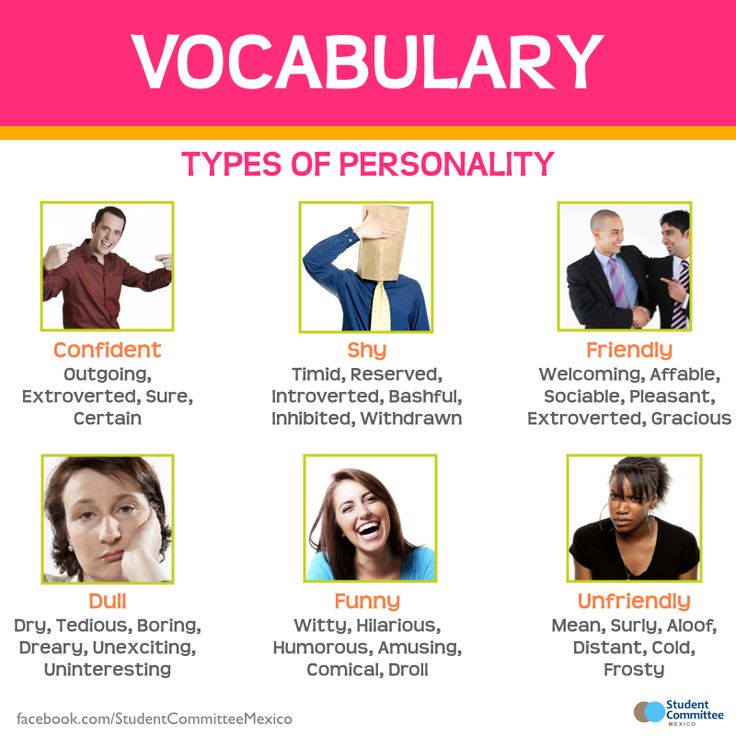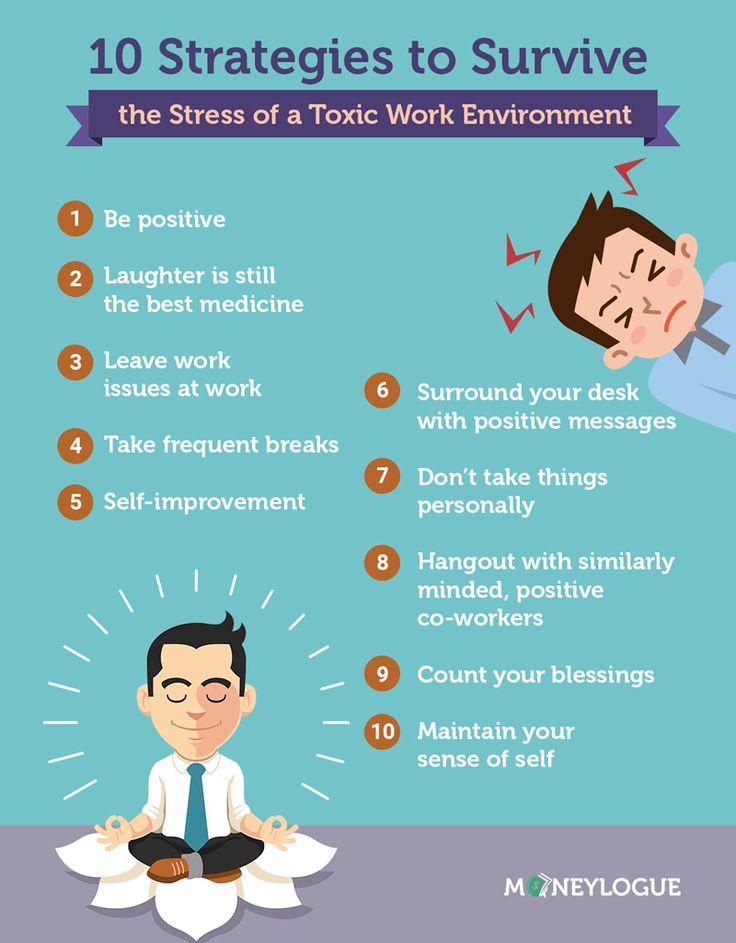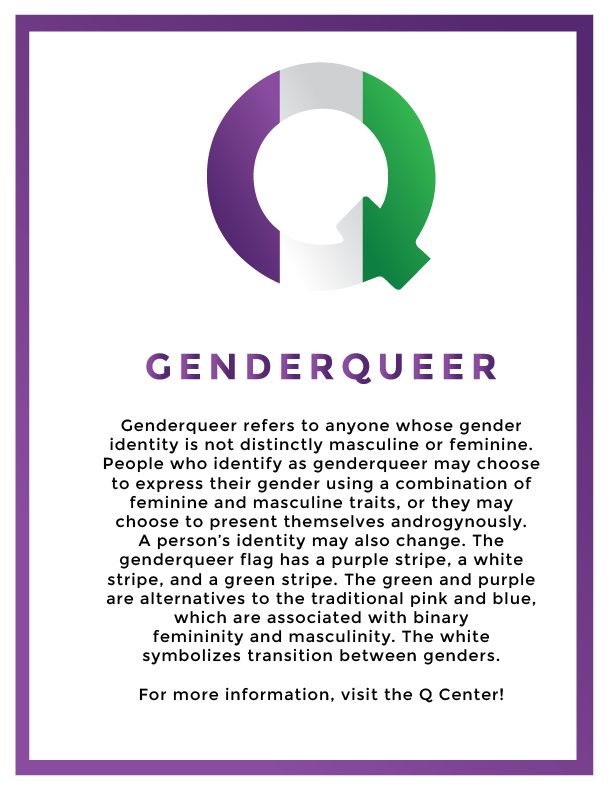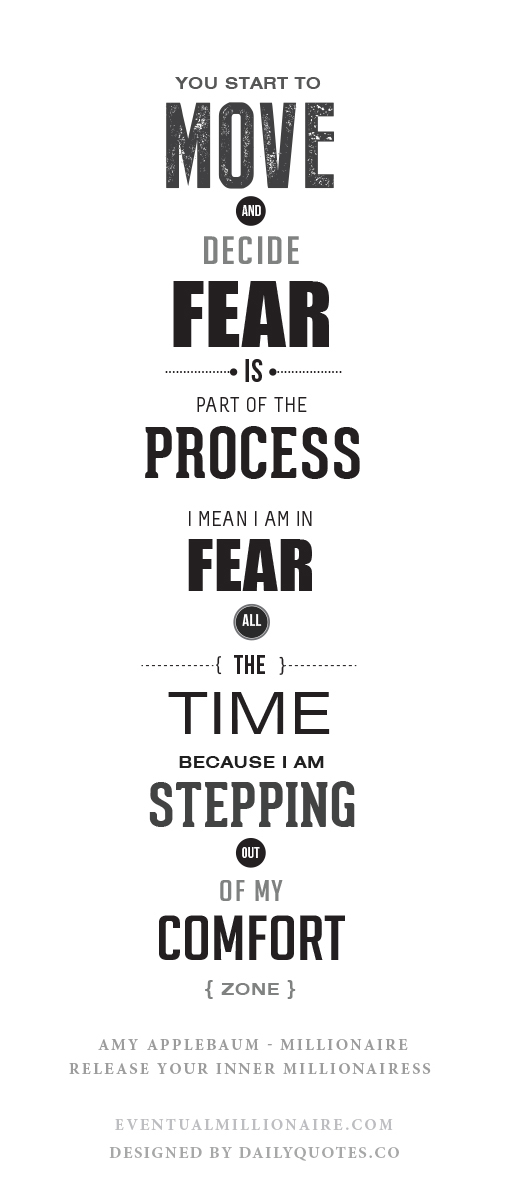Knowing personality types
6 Reasons Why Knowing Your Personality Type Can Change Your Life
Posted 18 April 2017 by
Melissa, MBTI Marketing Manager
We blog a lot about personality types, and how different parts of your personality type can help you make better decisions in your life. That said, not everyone knows the basics of MBTI personality type, so in this next series we’re going to cover some of the foundation of MBTI type theory and the preference pairs. While much of this information is foundational, we will have a few tidbits and tips in the blogs that you probably didn’t know (unless you’re an MBTI expert).
But before we dive into the series, we wanted to share a few reasons why this stuff matters. We may be a little biased, but we think this information can change your life for the better. It’s about much more than Extraverts and Introverts, or which Star Wars character you might share your four letter MBTI type with. Here are six reasons why knowing your personality type can change your life (for the better!):
- It answers the question of WHY
Personality type can help you better understand yourself and those around you. On the most basic level, knowing your personality type can help you answer the personal “why” question. You think a certain way and feel a certain way, but often it’s hard to understand why especially when other people aren’t thinking or feeling the same way. Why do you feel more comfortable planning out your vacation while someone else feels uncomfortable or even anxious planning out their trip and would rather have no schedule at all? Why you can network with the best of them and you’re not shy but you crave solitude after an hour or two of meet-and-greets. Understanding why you think, feel and act the way you do not only gives you piece of mind but…(continue to #2)
- It helps you figure out HOW
Now that you know the why, you can use that information to apply to present and future situations (and even look back into the past) to better understand how you can achieve more than you have. Knowing your personality type can help you find better answers to questions like, “how can I be happier”, “how do I find a career I’m passionate about”, “how can I better communicate with my (husband, wife, sister, mother, brother, father, friend, boyfriend, girlfriend, boss, coworker, etc.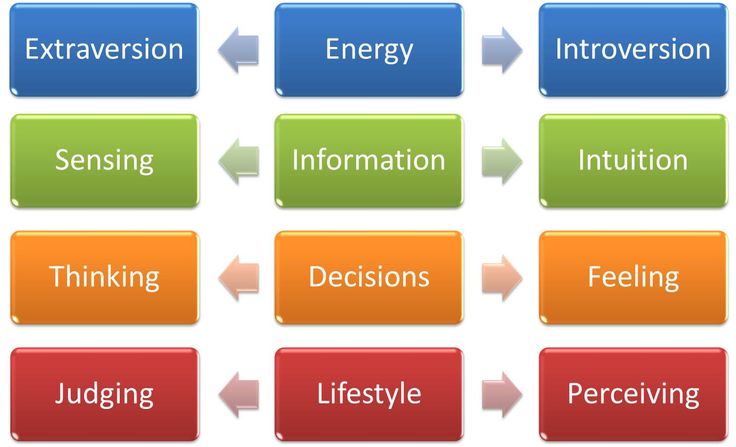 )”, "how do I stay motivated?" or “how can I make better decisions.” The amazing thing about understanding your personality is that the insights are actionable and applicable to nearly every situation in your life and can help you change for the better.
)”, "how do I stay motivated?" or “how can I make better decisions.” The amazing thing about understanding your personality is that the insights are actionable and applicable to nearly every situation in your life and can help you change for the better.
- Personality + Situation = Behavior
You can’t predict what sort of situations you’ll find yourself in over your lifetime, but you probably have a good idea that at some point there will be conflict, at some point you’ll be stressed, but hopefully most of the time the situations will be positive. What you can learn about yourself is your personality, and then knowing your personality and reading about different situations, you can start to predict your own behavior. Then you can change your behavior – which is ultimately what a lot of us want to do to be happier. For example, maybe when you’re stressed you tend to binge on Netflix and eat things you know you shouldn’t, or you start catastrophizing possible future outcomes in your mind.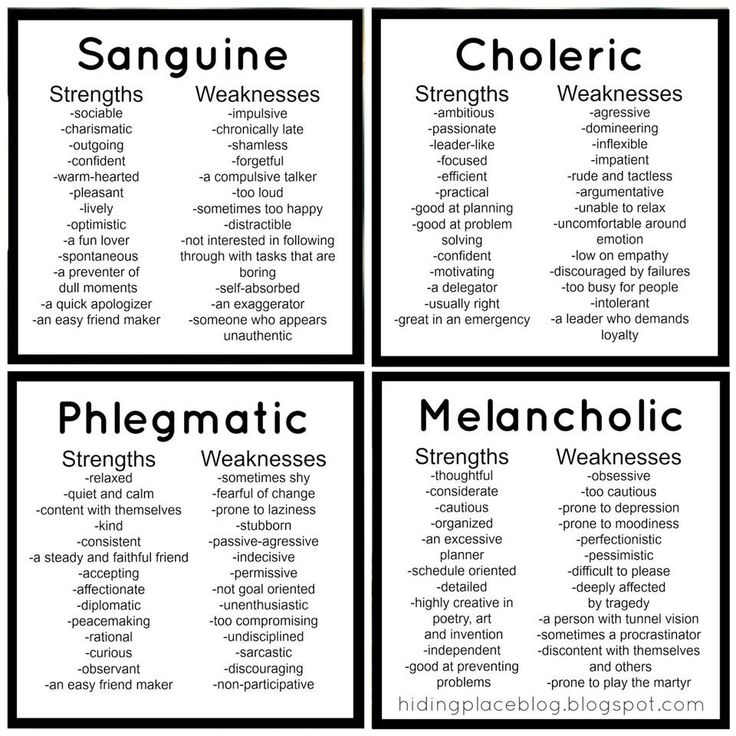 Knowing your personality and what common behaviors are associated with certain situations (conflict, stress, change, love) you can learn to stop behavior you don’t want to happen and try other behaviors instead of just letting these behaviors run on autopilot.
Knowing your personality and what common behaviors are associated with certain situations (conflict, stress, change, love) you can learn to stop behavior you don’t want to happen and try other behaviors instead of just letting these behaviors run on autopilot.
- Want to be happier? Start here.
There are things you can change, and things you can’t. When you’re looking at ways of improving your life and ultimately becoming happier, you have to look at the things you have control over. You don’t have control over certain parts of your personality, BUT you have control over changing your environments, your schedule and how you spend your time, and what your behavior is. Knowing more about your unique personality can help you be happier by first telling you how you’re most comfortable based on your personality preferences and second how best to play to your own strengths and address your own weaknesses, whether that be in your career, in your free time, in your relationships (and speaking of relationships…)
- It’s about YOU, and it’s also about THEM.
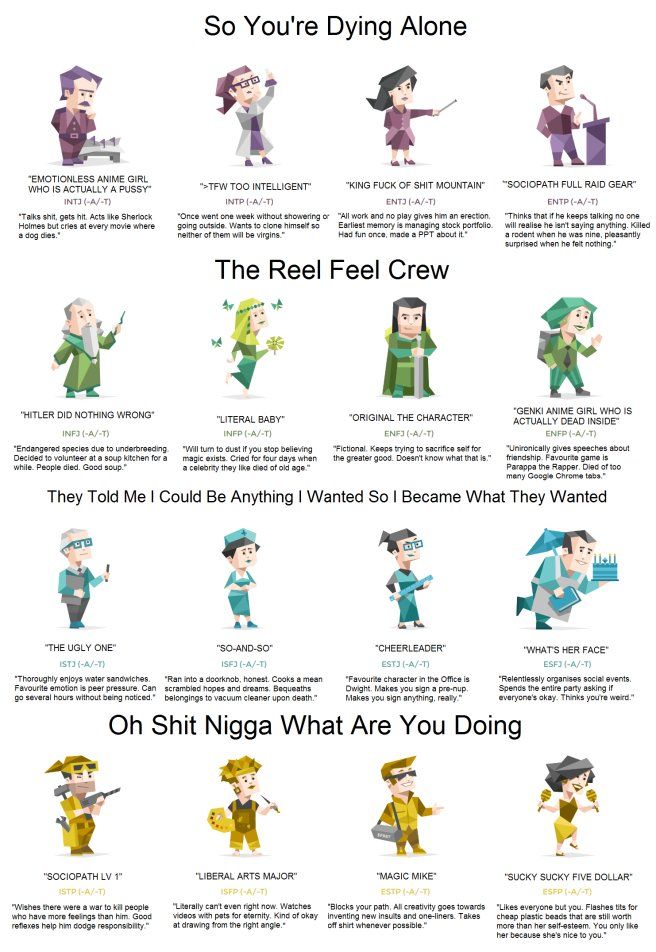
Learning about your Myers-Briggs personality preferences can tell you a lot about yourself, a lot about yourself if we’re being honest. But another added benefit of knowing about your personality type is to better understand them – the people around you whom you work with, interact with, go to family gatherings with, fight with, date, marry, take care of, pretty much anyone you have a social interaction with. By understanding your personality, you also understand what your personality is not, and can start to see differences in those around you in a deeper way. You have a language to think about and talk about differences in what energizes you, how you make decisions, how you take in information, and more. If you’ve understood the concept of “self-awareness”, think of this as the next logical step – “others-awareness.”
- Ready for the “Ah-ha!” moments?
Once you have a grasp of the foundation of personality type, if you want to use this knowledge for power just look around you.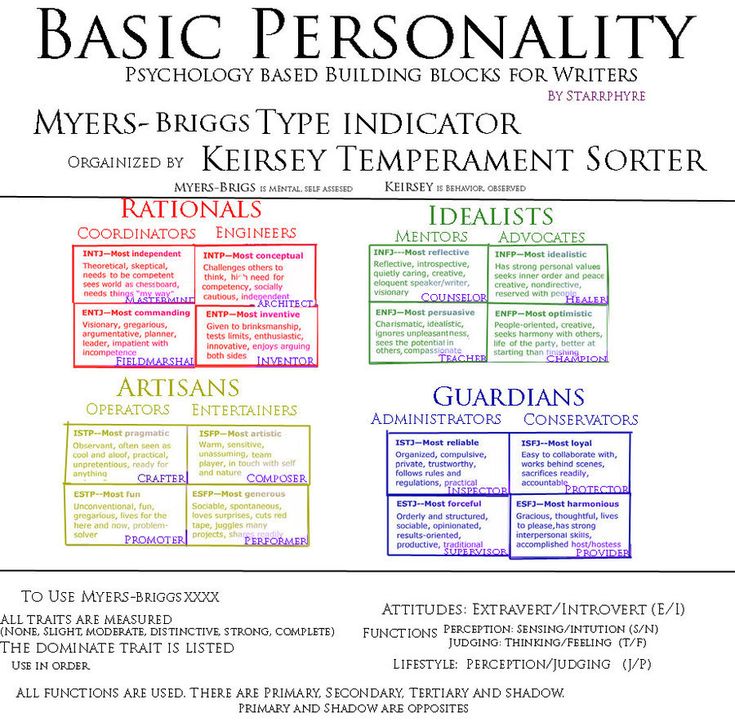 Start observing your own behaviors, your ups and downs, and the interactions you have with people around you, and then think about it in terms of personality type. We call these “ah-ha!” moments and as corny as it sounds, people who learn their personality type and understand the basic framework get these all the time. Situations that were frustrations with other people before become clear, understanding is at an all-time high, and you begin to make changes in your life for the better because you’re understanding what you need at your core and how you best function in the rest of the world. Pretty powerful if you ask us.
Start observing your own behaviors, your ups and downs, and the interactions you have with people around you, and then think about it in terms of personality type. We call these “ah-ha!” moments and as corny as it sounds, people who learn their personality type and understand the basic framework get these all the time. Situations that were frustrations with other people before become clear, understanding is at an all-time high, and you begin to make changes in your life for the better because you’re understanding what you need at your core and how you best function in the rest of the world. Pretty powerful if you ask us.
Understanding the 4 Personality Types: A, B, C, and D
Each person is a unique combination of four personality types. Over the centuries, these basic categories have gone by several names and designations, but for our purposes, they're known as the director, the socializer, the thinker, and the supporter. As shorthand, though, we refer to those types of personality as A, B, C, and D, respectively.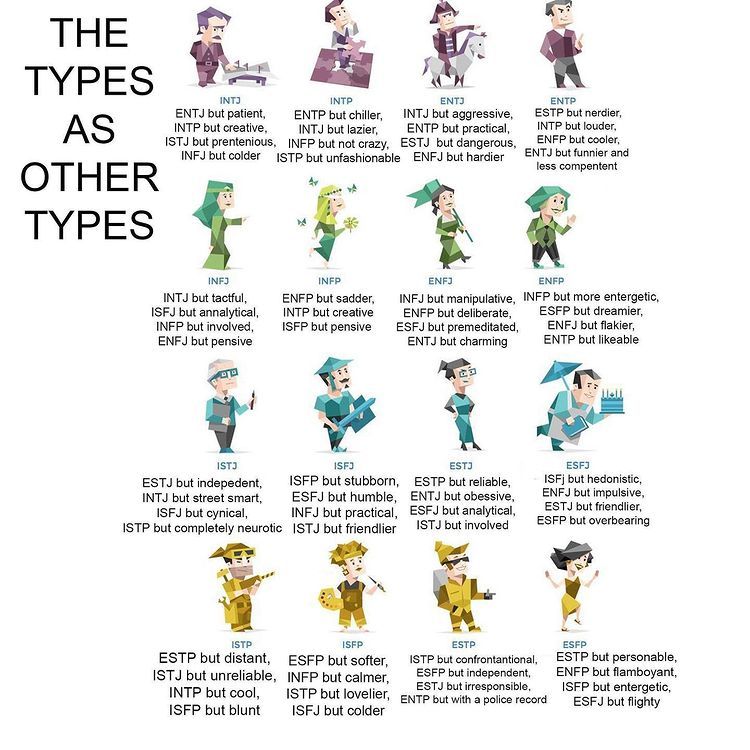
Learning how to identify people by personality type can bring a higher level of understanding to interpersonal relationships and team building, especially for employers looking for ways to avoid bad hires and reduce turnover. Indeed, a good personality test may be the most valuable tool in a hiring manager's toolbox.
Table of Contents:
- Type A personality
- Type A vs. Type B personality
- Type B personality
- Type C personality
- Type D personality
- Type X personality
- Other personality types and theories
Try our personality test free
What is a Type A personality?
A Type A personality likes to be in control of their environment and their lives. They're normally not very detail-oriented, choosing to delegate details to others.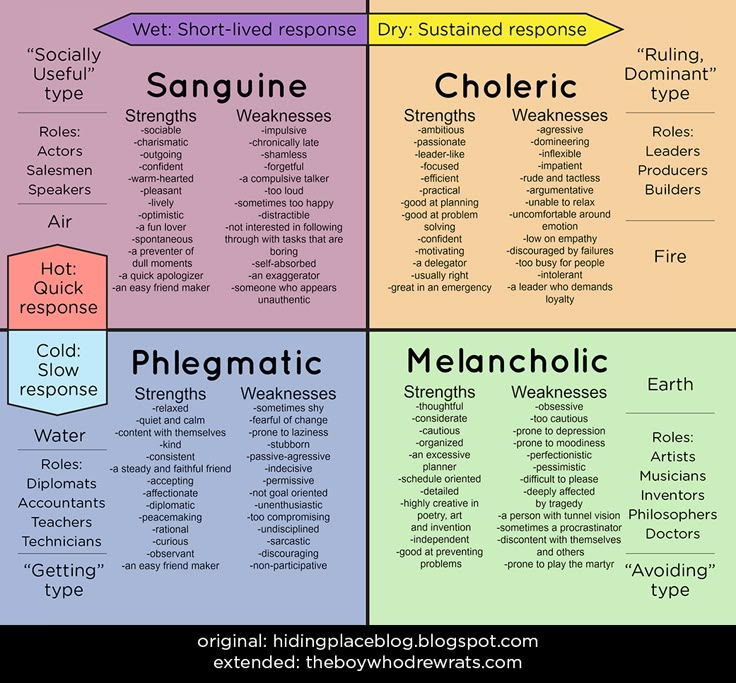 They're usually very goal-oriented and practical in their solutions. They arrive at solutions and goals with a no-nonsense, bottom-line approach.
They're usually very goal-oriented and practical in their solutions. They arrive at solutions and goals with a no-nonsense, bottom-line approach.
Type A personality characteristics
While some Type A personality traits vary from person to person, certain traits are common. The best example of a Type A personality is someone who is:
- Take-charge and highly competitive
- Fast-paced and impatient
- Entrepreneurial, workaholic
- Embraces change
- Ambitious
- Works well independently
- Passionate but short-fused
- Demands maximum freedom
- Dominant and stubborn
- Multitasking
What are other names for the Type A personality?
Here are some other names for and best examples of Type A personalities.
| Personality Tests & Approaches | Type A Personality Name |
|---|---|
| The Hire Success® System | Director |
| Hippocrates | Choleric (bodily humor: yellow bile) |
| Plato | Guardian |
| Jung | Sensor |
| DISC | D; Direct/Controlling |
| Insight | Blue |
| Myers-Briggs | ESTJ, ENTJ, ENFP |
| Enneagram | Adventurer/Achiever |
| PSI | Controller |
| Biblical character | Paul |
| Cartoon/comic characters | Lucy (from Peanuts) / Rabbit (from Winnie the Pooh) |
How to test Type A personality
A Hire Success® Type A personality test assesses behavioral characteristics.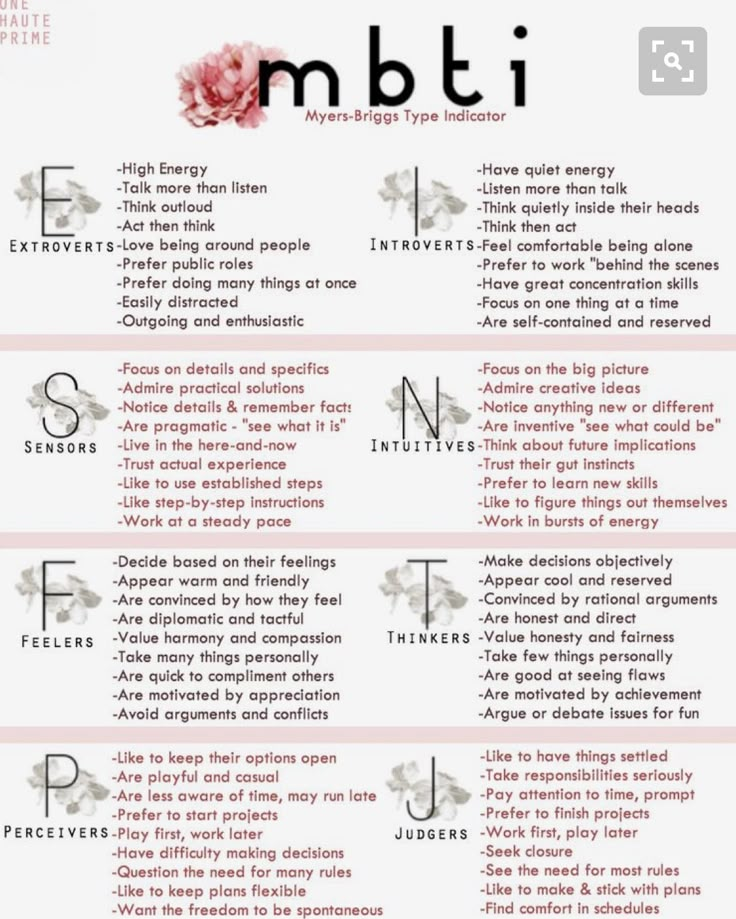 You'll get an idea of how well positive aspects like drive, perfectionism and ability to work independently balance negatives like impatience, hostility and low empathy. The test is quick, easy and even fun for employees-and gives you valuable hiring and managing insights.
You'll get an idea of how well positive aspects like drive, perfectionism and ability to work independently balance negatives like impatience, hostility and low empathy. The test is quick, easy and even fun for employees-and gives you valuable hiring and managing insights.
Try Free Book demo
Type A personality at work
When it comes to work personality types, employees with Type A personalities can typically be identified by the following traits:
- Goal-oriented
- Risk-taking
- Good under stress
- Works well independently
- Direct management style
- Good delegation skills
- Good administrative skills
- Workaholic
Type A personalities don't like a lot of restraints or restrictions placed on them. Instead, they prefer to work independently and set their own schedules. Since they tend to be workaholics, it's not unusual to see them put in whatever time and effort it takes to accomplish their goals. They may seem impatient at times, especially if they believe someone is spending too much time going over details with them or impeding their stride.
They may seem impatient at times, especially if they believe someone is spending too much time going over details with them or impeding their stride.
Don't be surprised to see this personality type in a supervisory position or management. Having an entrepreneurial streak, they may be a business owner or strive to own their own business someday. Type A personalities are confident and not easily discouraged.
Pros and cons of hiring Type A personality
If a Type A personality sees their day-to-day job as routine or repetitive, they'll get bored easily and won't enjoy the work. They'll want others to view them as tough in these situations, but internally they may be miserable if the job is too routine. Dominant in nature, Type A personalities will do whatever is necessary to prevent themselves from falling into patterns or routines and seek freedom instead. They'll also be very dissatisfied if they believe someone is trying to manipulate them.
A Type A personality may not be very good at recognizing coworker's feelings and needs.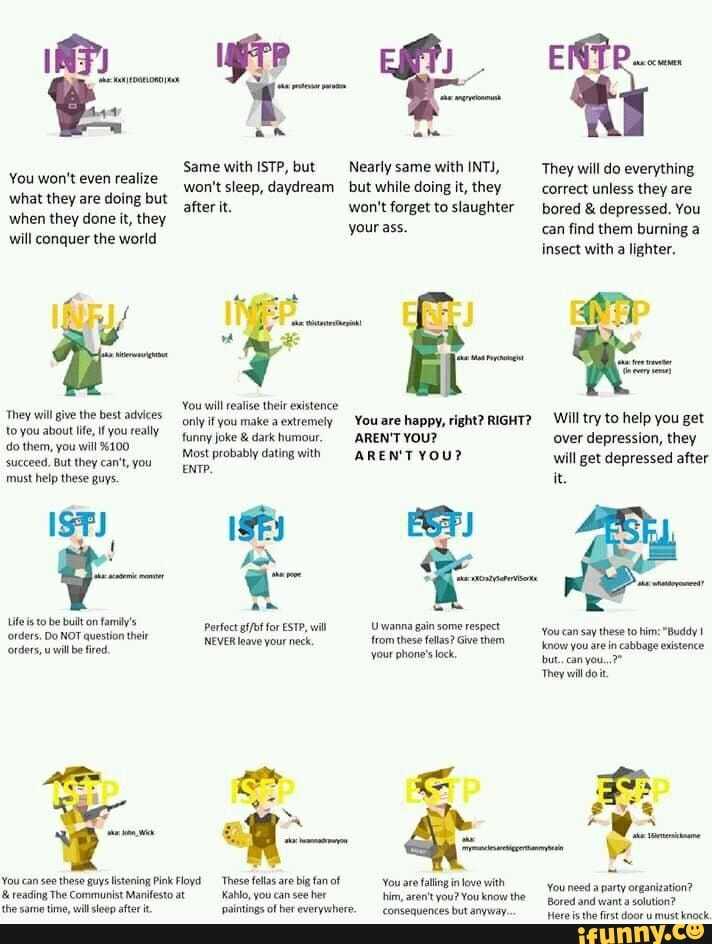 They're extremely focused on achieving their goals and may not notice. If you're looking for someone who works well under pressure and seems to excel in high-stress situations, the Type A personality is the best pick.
They're extremely focused on achieving their goals and may not notice. If you're looking for someone who works well under pressure and seems to excel in high-stress situations, the Type A personality is the best pick.
How to deal with Type A personality at work
Managing employees with type A personality traits at work is a balance. They can be valuable in terms of problem solving and productivity, but when unmanaged, can be disruptive. Managing motivations and situations is the key.
What motivates a Type A personality?
- Money
- Opportunity
- Freedom
- Favorable risk-reward ratio
- Challenges
- Urgency
- Success
- Leadership
What are some common words or phrases that motivate or grab the attention of the Type A personality?
- "Let's get it done."
- Fast
- Results
- Immediate/today/now
- The bottom line
- "What do you think about ___?"
- "The best (newest, cutting-edge, etc.
 )"
)" - Take the challenge
- Great return on investment
What are the turnoffs, dislikes, and fears of the Type A personality?
- Touchy-feely things
- Long explanations or descriptions
- Explaining things in emotional terms or more than once to the same person
- Looking vulnerable
- Falling into routines
- Being manipulated
- Losing
Which jobs attract a Type A personality?
The best careers for Type A personality include:
- President/CEO
- General contractor
- Salesperson or sales manager
- Business owner
- Politician
- Entrepreneur
- Police/military officer
- Manager
- Executive
Back to Top
Type A vs. Type B personality
Having a mix of personalities on your team and ensuring that they mesh will help your department or company truly excel. Understanding a Type A vs. Type B personality will help you get the balance right between these two working styles.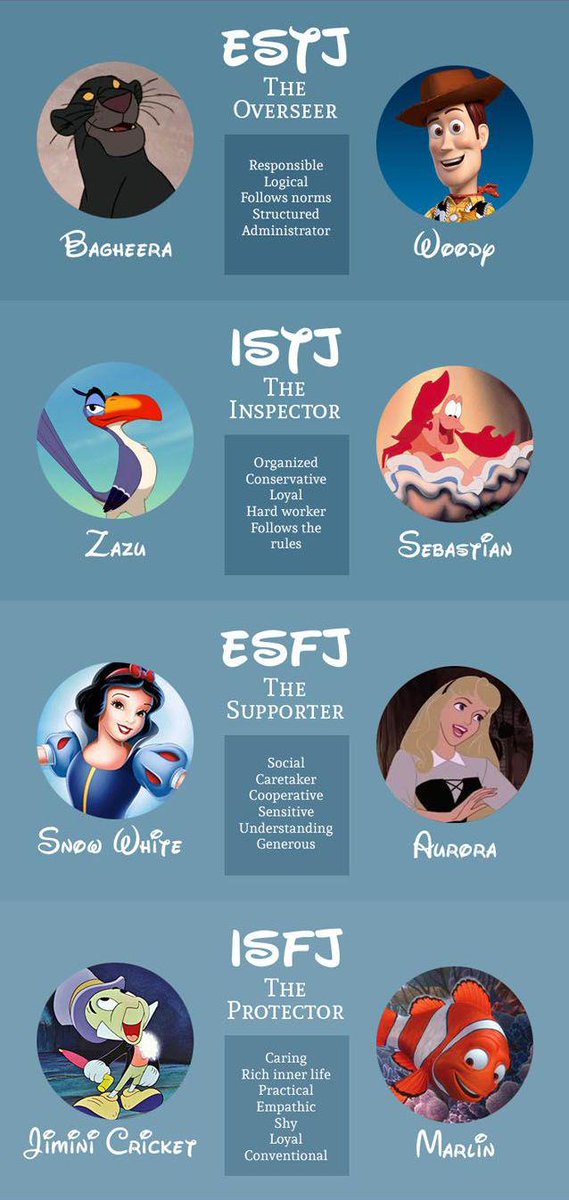
Pair goal-oriented, future-thinking Type A people with agreeable and present-focused Type Bs.
Controlling Type As can be complimented by Type Bs who work on forging strong relationships.
Self-motivated Type As can keep Type Bs, who are driven by others on the team, focused in the right direction.
It helps to understand both personality types when balancing out teams. Here is a deep dive into what a Type B personality is.
What is a Type B personality?
The Type B personality is a very outgoing, energetic and fast-paced individual who likes to be around people and enjoys being the center of attention. They're good relationship-builders and most people like them right away. Their driving need is for approval, so they try to like everyone in hopes everyone will like them, too. Compliments, acknowledgement of their achievements, words of admiration, and even applause from these groups are the most important thing you can do for them.
Type B personality traits
Like Type A personalities, Type B personality characteristics can also vary by individual.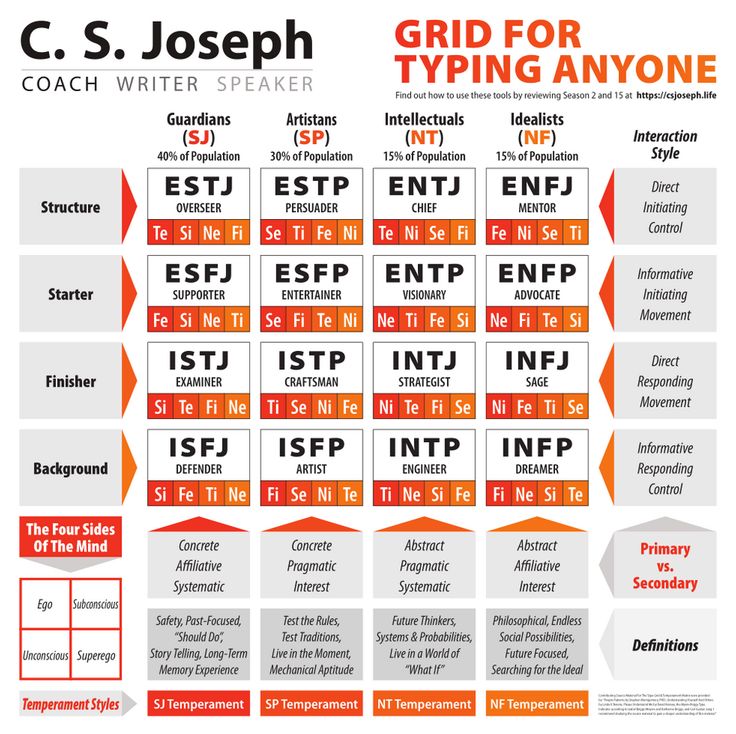 The best example of Type B personality is someone who is:
The best example of Type B personality is someone who is:
- Enthusiastic and fun-loving
- Persuasive
- Friendly
- Charismatic and confident
- Idea person, dreamer
- Short attention span
- Motivator
- Spontaneous and impulsive
- Procrastinator
What are other names for the Type B personality?
| Personality Tests & Approaches | Type B Personality Name |
|---|---|
| The Hire Success® System | Socializer |
| Hippocrates | Sanguine (bodily humor: blood) |
| Plato | Artisan |
| Jung | Intuitor |
| DISC | I; direct/supporting |
| Insight | Green |
| Myers-Briggs | ENTJ, ENTP, INTJ, INTP |
| Enneagram | Helper/romantic |
| PSI | Promoter |
| Biblical character | Peter |
| Cartoon/comic characters | Snoopy (from Peanuts) / Tigger (from Winnie the Pooh) |
How to test Type B personality
The Hire Success® Type B personality test helps you assess how a given person will fit within your culture and teams.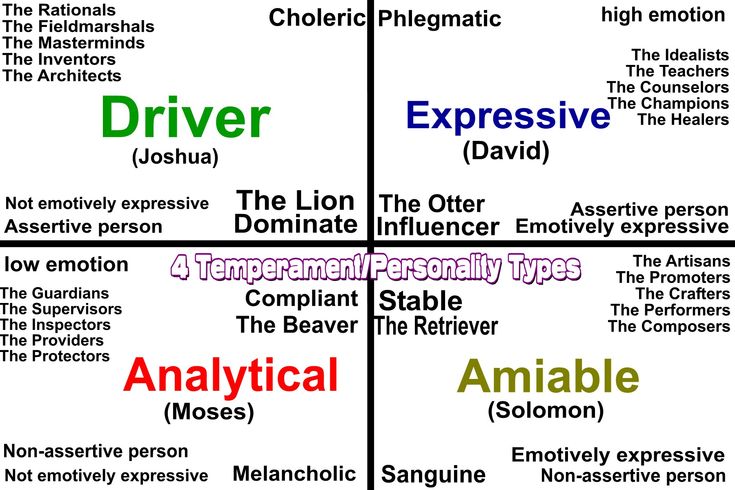 While you may make you feel comfortable surrounding yourself with people like you, it's better to have a good balance of personalities on your team.
While you may make you feel comfortable surrounding yourself with people like you, it's better to have a good balance of personalities on your team.
This test lets you find Type B personality traits like being easy-going, optimistic, creative and a team player with weaknesses like being impulsive, needy of validation, and procrastinating. The test is easy and gives you valuable insights for hiring and managing potential team members.
Try Free Book demo
Type B personality at work
Employees with Type B personalities can typically be identified by the following traits:
- Relationship-oriented
- Outgoing
- Enthusiastic
- Doesn't finish what was started
- May try to do too much at once
- Easily bored
- Easily liked by most people
Type B personalities love to talk about themselves. Some may view that as self-centered, but a Type B's real motivation is to be liked. For an extreme example, Bette Midler in the movie Beaches invited an old friend up to see her lavish apartment and told her about her great success.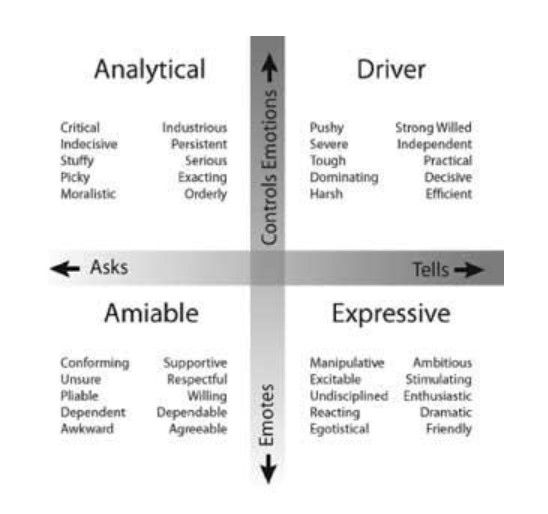 She said to the friend: "Enough about me. Let's talk about you. So, what do you think of me?"
She said to the friend: "Enough about me. Let's talk about you. So, what do you think of me?"
The Type B personality's biggest fear is being humiliated in public, since that might make many people disapprove of them. It could be traumatic for them. The B personality doesn't want to appear unattractive or unsuccessful either, so they'll hide any weakness.
Pros and cons of hiring Type B personality
Some of the strengths you can count on from the Type B personality are their enthusiasm, outgoing behavior, friendliness, and their ability to persuade even the most skeptical of people. They tend to be dreamers and can often turn those dreams into very practical ideas in the workplace. Type B personalities are spontaneous and use their quick wit and humor to make people like them. They aren't very good about hiding their own feelings either, so if they're hurt or disappointed, you'll probably be able to read it in their mannerisms and overall disposition.
Some of the natural weaknesses associated with the Type B personality include being impatience, a short attention span, and not being very detail-oriented.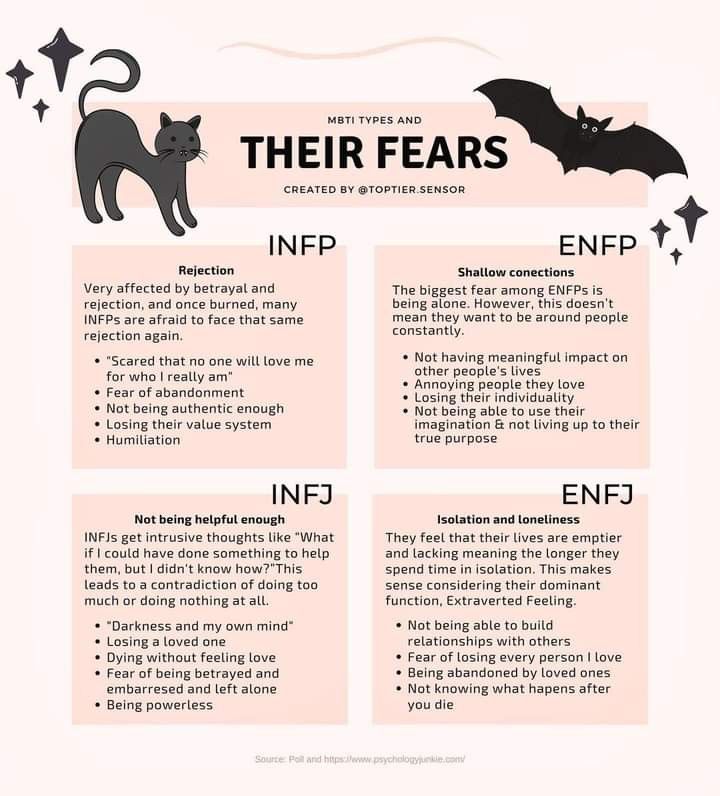 In business, Type B personalities may tend to over-socialize and not spend as much time doing their work because they strive for social interaction. During the hiring process, they may be inclined toward unstructured, rambling interviews rather than structured ones, and bad interviews can lead to bad hires. Despite their natural tendency, many Type B personalities have learned to keep their counterproductive impulses in check while benefiting from the positives.
In business, Type B personalities may tend to over-socialize and not spend as much time doing their work because they strive for social interaction. During the hiring process, they may be inclined toward unstructured, rambling interviews rather than structured ones, and bad interviews can lead to bad hires. Despite their natural tendency, many Type B personalities have learned to keep their counterproductive impulses in check while benefiting from the positives.
How to deal with Type B personality at work
Put Type B people on teams and spend time working with them directly. Avoid putting them in a solitary position with little interaction because they're most effective in collaborative situations. They're also ideal for positions where they must interact with customers or suppliers and thrive in social settings.
What motivates a Type B personality?
- Public recognition
- Awards, plaques, certificates
- Having picture taken with celebrities
- Succeeding, especially beyond peers
- Being the center of attention, public speaker, director, etc.
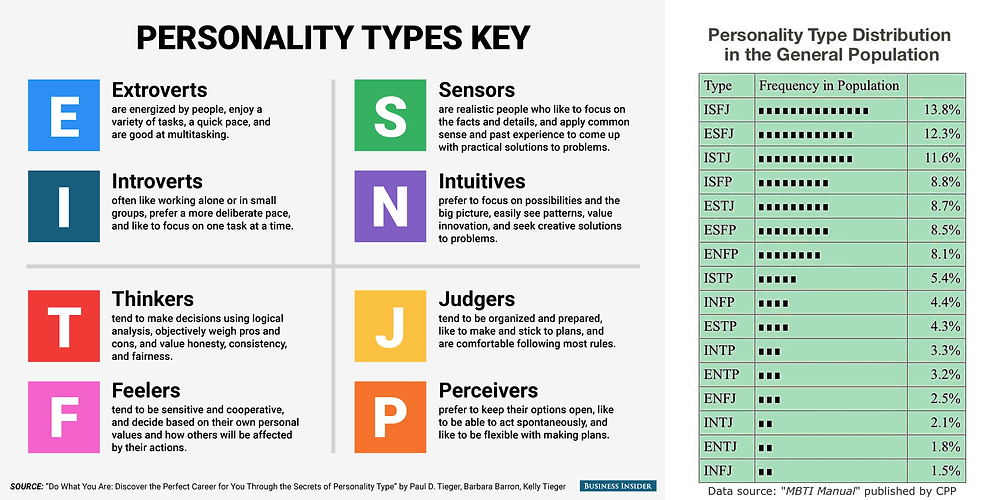
- Acceptance
- The latest styles and/or trends
What are some common words or phrases that motivate or grab the attention of the Type B personality?
- "You look great."
- "You're the best ____."
- "People love you."
- "This will be fun."
- Entertaining
What are the turnoffs, dislikes, and fears of the Type B personality?
- Public humiliation
- Being unappreciated
- Appearing uninvolved
- Nonsocial types
- Appearing unattractive
- People and things that distract attention
- Appearing unsuccessful
- Appearing unacceptable
The best careers for Type B personality include:
- Public relations
- Salesperson
- Entertainment
- Personnel interviewer
- Professional host(ess)
- Politician
- Recreation director
- Party planner
- Customer service/relations
Back to Top
What is a Type C personality?
The Type C personality is a very detail-oriented individual who likes to be involved in things that are controlled and stable.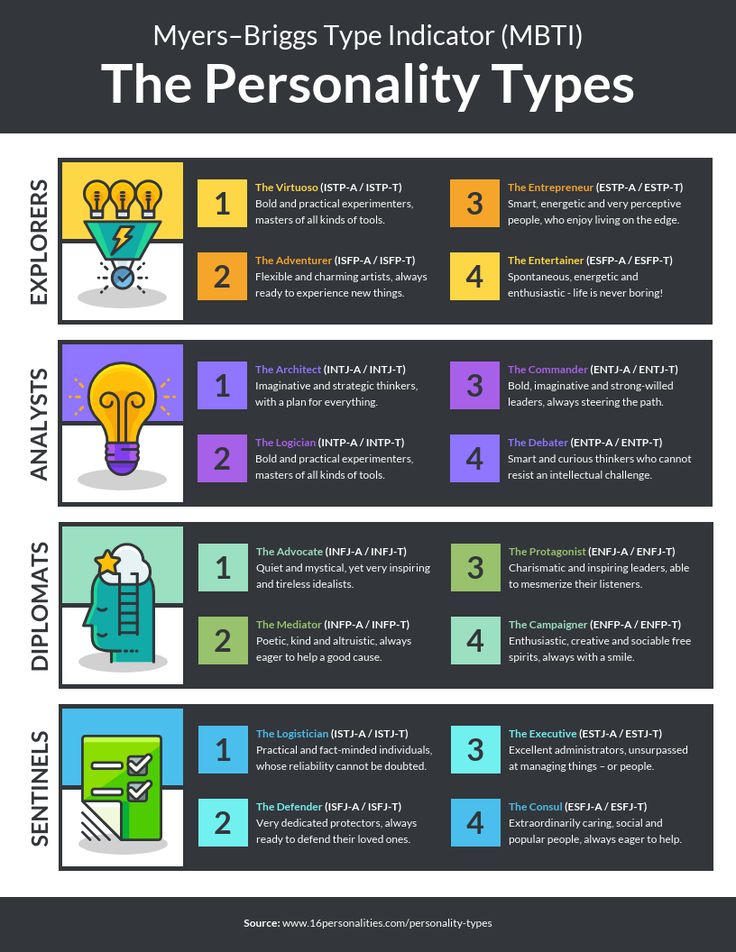 They're interested in accuracy, rationality, and logic. People who can't seem to control their emotions will bother them because Type C personalities believe being emotional makes objectivity difficult. They also dislike being around people who are full of hype, since they desire facts, accuracy and logic. Other people's emotions may not be a priority for them, as they tend to strive for the facts and let the chips fall where they may.
They're interested in accuracy, rationality, and logic. People who can't seem to control their emotions will bother them because Type C personalities believe being emotional makes objectivity difficult. They also dislike being around people who are full of hype, since they desire facts, accuracy and logic. Other people's emotions may not be a priority for them, as they tend to strive for the facts and let the chips fall where they may.
Type C personality characteristics
Type C personalities come with considerable variations, however, the best example of a Type C personality is someone who is:
- Accuracy and detail-oriented
- Creative
- Dependable
- Skeptical
- Independent and can appear anti-social
- Lawful
- Organized
- Analytical and critical
- Worried about progress
- Detached and disengaged
What are other names for the Type C personality?
| Personality Tests & Approaches | Type C Personality Name |
|---|---|
| The Hire Success® System | Thinker |
| Hippocrates | Melancholic (bodily humor: black bile) |
| Plato | Scientist |
| Jung | Thinker |
| DISC | C; indirect/controlling |
| Insight | Gold |
| Myers-Briggs | ESTJ, ESFJ, ISTJ, ISFJ |
| Enneagram | Asserter/perfectionist |
| PSI | Analyst |
| Biblical character | Moses |
| Cartoon/comic characters | Linus (from Peanuts) / Eeyore (from Winnie the Pooh) |
How to test Type C personality
The Hire Success® Type C personality test helps you find people with traits in this cluster.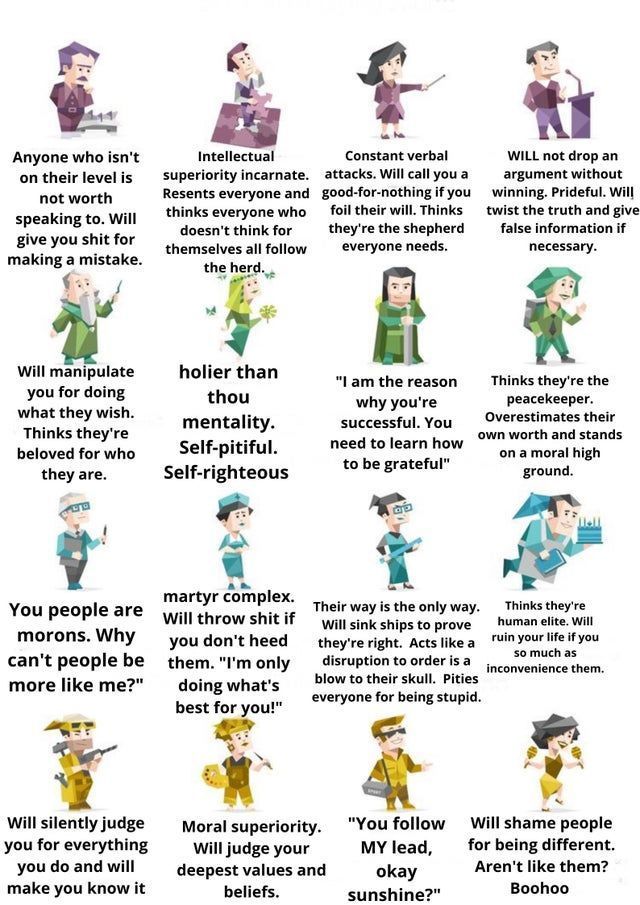 You will be able to quickly assess the positives, like detail-oriented focus, ability to work alone, troubleshooting and planning skills. You will be able to manage the negatives like social inhibition, conflict avoidance and anxiety.
You will be able to quickly assess the positives, like detail-oriented focus, ability to work alone, troubleshooting and planning skills. You will be able to manage the negatives like social inhibition, conflict avoidance and anxiety.
Try Free Book demo
Type C personality at work
People with Type C personalities can typically be identified by the following traits:
- Detail-oriented
- Logical
- Prepared
- Likes to do things their own way
- Worry about progress
- May never have personal expectations met
- Quality control
Type C personalities tend to be quite controlling, both of themselves and others. They don't like things to get out of hand and may appear stoic because they don't really want themselves to display a lot of emotion. They're very outcome-driven and will be sticklers for following protocol.
They're careful, resourceful, and, above all, excellent thinkers who will look at all aspects of an issue before taking a stand.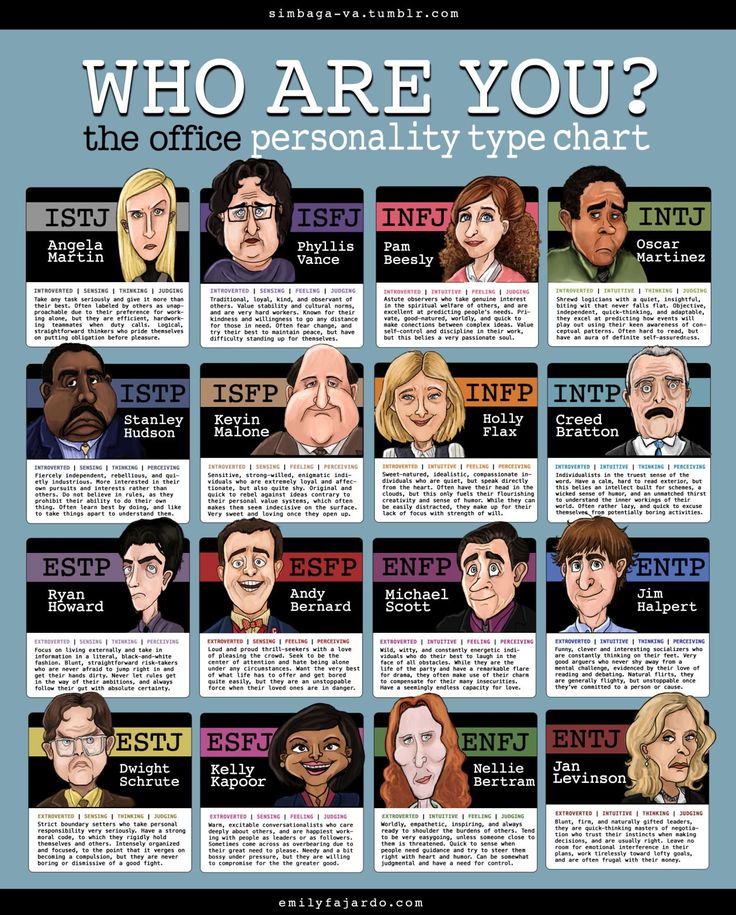 Once they take a stand on an issue, though, they'll have the facts to back it up, so anyone who challenges them better be prepared. If you have a Type C personality on your job candidate shortlist, you'll want to prepare some thoughtful interview questions if you don't want a carefully rehearsed response.
Once they take a stand on an issue, though, they'll have the facts to back it up, so anyone who challenges them better be prepared. If you have a Type C personality on your job candidate shortlist, you'll want to prepare some thoughtful interview questions if you don't want a carefully rehearsed response.
Pros and cons of hiring Type C personality
Type C personalities like their jobs to be clearly defined and want to know their expectations. Knowing those facts, they will be able to prioritize their tasks and see them through to completion.
In managerial roles, they're cautious and logical and require many details and facts before they make a decision. People who try to sell them something with emotion usually fail. The Type C personality would consider such an effort to be hype and would wonder what facts the other person is trying to hide.
In more public roles, Type C personalities will strive for originality, cleverness and uniqueness in all things. Because of their detailed orientation, they're meticulously prepared to defend their decisions against any possible objections.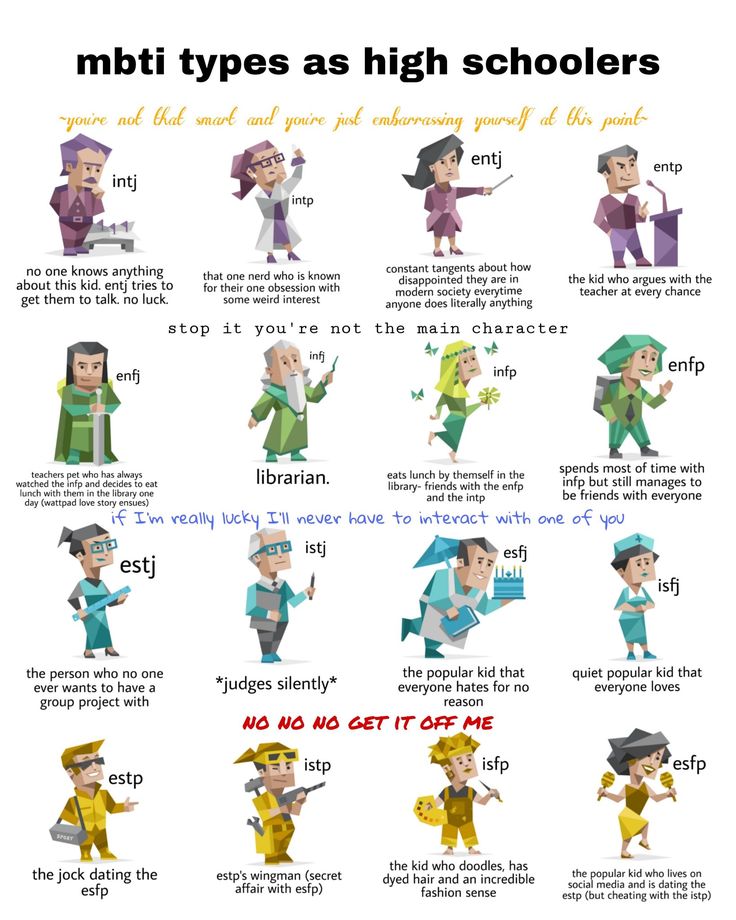 Many accountants and lawyers are Type C personalities. They're excellent for any job that requires creative thinking based on patience, facts and accuracy.
Many accountants and lawyers are Type C personalities. They're excellent for any job that requires creative thinking based on patience, facts and accuracy.
How to deal with Type C personality at work
Those with Type C personality traits can play valuable roles on your team. They're motivated to handle important tasks that require determination and an eye for detail. They're less comfortable in leadership positions and prefer to work alone.
What motivates a Type C personality?
- Control
- Opportunities to be independent and analytical
- Challenges
- Problem-solving
What are some common words or phrases that motivate or grab the attention of the Type C personality?
- Perfection
- "How does that work?"
- Quiet, solitude
- "Tell me more about ____."
What are the turnoffs, dislikes, and fears of the Type C personality?
- Uncontrolled emotions
- Irrational acts
- Indecision
- People who are self-centered, or self-aggrandizement
- Loss of control
- Being subject to control or supervision by people they don't trust or respect
- Distractions or distracting people
Which jobs attract a Type C personality?
The best careers for Type C personality include:
- Forecaster
- Troubleshooter
- Critic
- Investigator (police, crime scene, private, etc.
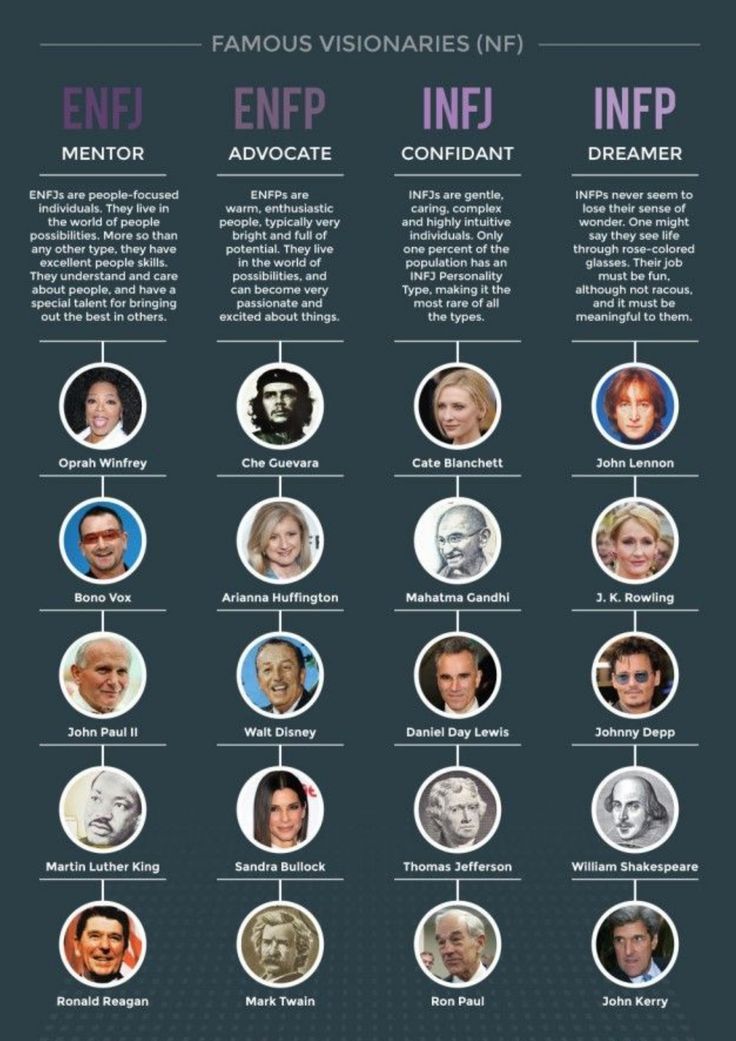 )
) - Engineer
- Technical support
- Research scientist
- Game designer
- Data analyst
- Pilot
- Programmer/analyst
- Artist
- Actuary
- Musician
- Accountant/auditor
- Inventor
Back to Top
What is a Type D personality?
A Type D personality takes a slower, easier pace toward their work and life in general. They seek security and longevity on the job and are very happy doing a repetitive task day in and day out. The repetition allows them to become very skilled. Likewise, they won't like it if the rules change a lot. That's contrary to their desire to minimize change and stick with what they know works. For the Type D personality, even though the current way may be unpleasant, they worry that the unknown may be even worse.
Type D personality traits
As with the previous personalities, you'll find plenty of variation with Type D people. The best example of a Type D personality is someone who is:
- Shy, low-key and observant
- Caring
- Sincere
- Consistent, dependable
- Calm and stable
- Fair and equitable
- Looks approachable
- Avoiding confrontation
- Resistant to change
- Self-confident
What are other names for the Type D personality?
| Personality Tests & Approaches | Type D Personality Name |
|---|---|
| The Hire Success® System | Supporter |
| Hippocrates | Phlegmatic (bodily humor: phlegm) |
| Plato | Philosopher |
| Jung | Feeler |
| DISC | S; indirect/supporting |
| Insight | Orange |
| Myers-Briggs | ESTP, ESFP, ISTP, ISFP |
| Enneagram | Peacemaker/observer |
| PSI | Supporter |
| Biblical character | Abraham |
| Cartoon/comic characters | Charlie Brown (from Peanuts) / Winnie the Pooh |
How to test Type D personality
Because Type D personalities are anything but easy going, finding out what makes them tick can help you get the most from hiring this type.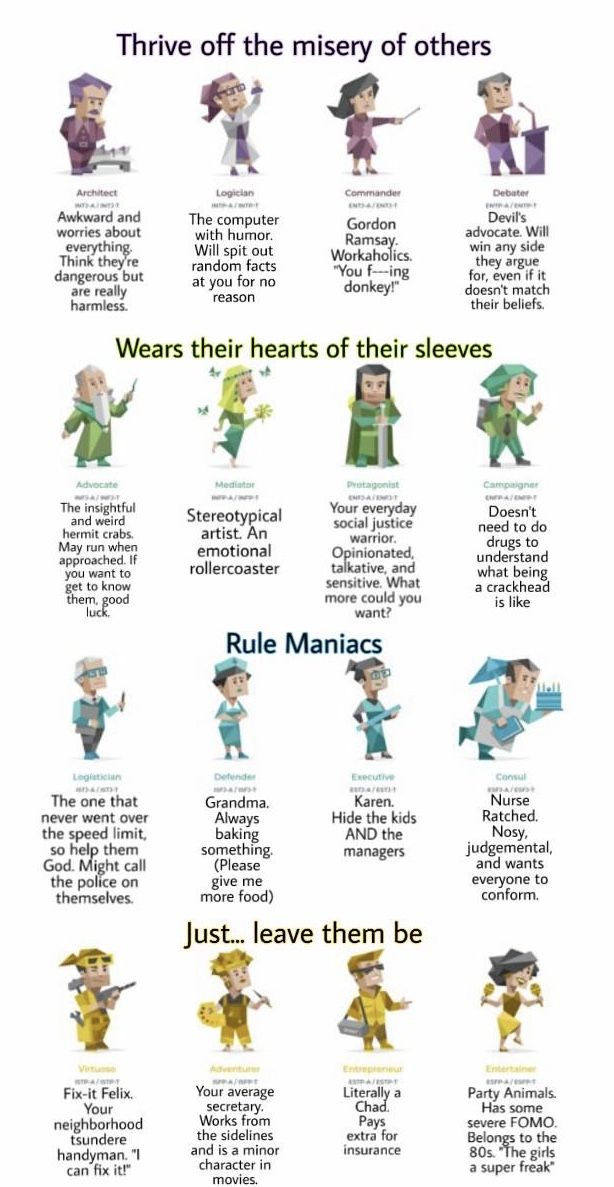 While they're highly trustworthy, compassionate, and deep thinkers, they can suffer from low self-confidence and pessimism. The Hire Success® Type D personality test will help you find the right place for them on your team.
While they're highly trustworthy, compassionate, and deep thinkers, they can suffer from low self-confidence and pessimism. The Hire Success® Type D personality test will help you find the right place for them on your team.
Try Free Book demo
Type D personality at work
People with Type D personalities can typically be identified by the following traits:
- Task-oriented
- Stabilizing
- Cautious
- Going along when they don't agree
- Easily used by others
- Uncomfortable with constant change
- Good at routines or repetitive tasks
They seek the respect, sincere admiration, and acceptance of others. The Type D personality will gladly work hard to please the people they work for as long as they feel appreciated and receive plenty of reassurance that they're needed. They need that sense of security. Type D personalities often think the Type A personality is crazy for taking so many risks and not showing much concern for security and longevity.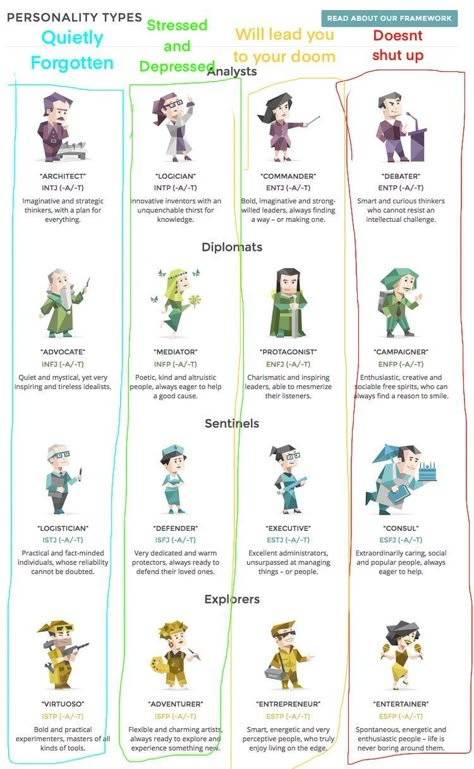
Pros and cons of hiring Type D personality
People with Type D personality traits are usually very organized; being around a messy environment or disorganization will bother them. They're also good at playing a very supportive role with others and are normally very caring, thoughtful, and compassionate. They're patient, tend to be good listeners and will persevere when all others have given up. A stabilizing force, they especially like working in a group or on a team.
Although they may not be as fast as others, they're accurate and thorough. They'll usually keep their feelings to themselves and are reluctant to express themselves, even if a more assertive type seems to be taking advantage of them. They tend to go along with anything.
To attract the Type D personality in a job ad, be sure to talk about the company benefits package and the long-term growth potential within the company. Having a secure, stable environment will be very important to Type D personalities.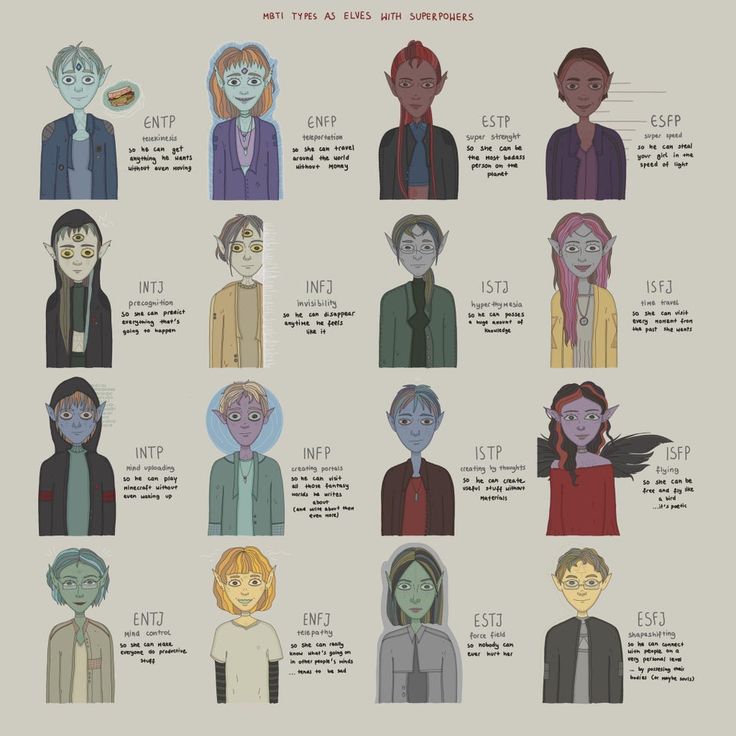
How to deal with Type D personality at work
Managing a Type D personality takes some finesse. You cannot let their natural pessimism and social comfort issues bring down the team. Their hard-working nature, compassion and honesty are valuable strengths. They're keen at observation and think things through, so they can be valuable at solving problems and reducing risk.
What motivates a Type D personality?
- Stability
- Benefits
- Security
- Low risk
- Routine
- Team/group opportunities
- Calm work atmosphere
What are some common words or phrases that motivate or grab the attention of the Type D personality?
- "Help others in need"
- Relaxed atmosphere
- Logical
- Rational
What are the turnoffs, dislikes, and fears of the Type D personality?
- Risks
- Pushy people
- Change (especially frequent change)
- Instability
- Disorganization
- Aggressive behavior
- Disruption in routine
- Surprises
- The unknown
- Conflict
Which jobs attract a Type D personality?
Considering the benefits they bring to your organization, the best careers for Type D personality include:
- Secure team position
- Administrator
- Financial services
- HR manager
- Social worker
- Bureaucrat
- Family doctor/nurse
- Assembly line worker
- Residential/community services
- Mechanic
- Teacher
- Counselor
- Personal assistant/secretary
- Minister
- Insurance agent
- Supervisor
- Librarian
- Security guard
- Customer service representative
Back to Top
What is a Type X personality?
Whenever two or more personality types are equal in strength within a person, that person is considered a Type X personality.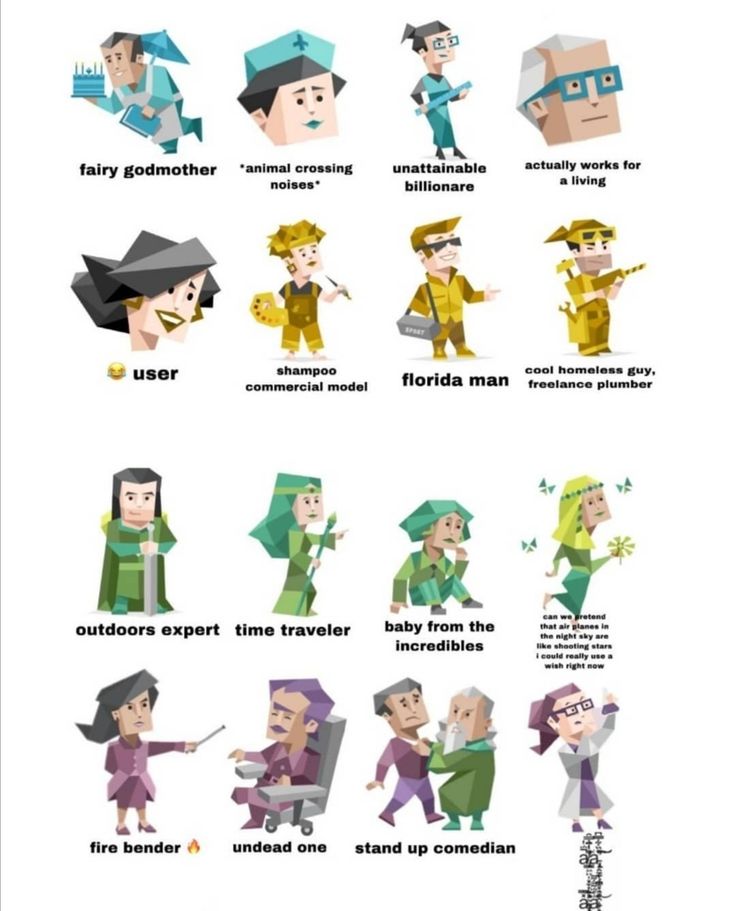 For example, if an individual's two highest-strength personality types were A and B, they might be identified as AX and BX. In the rare event that all four personality types were identical, that person would be considered simply as a Type X personality.
For example, if an individual's two highest-strength personality types were A and B, they might be identified as AX and BX. In the rare event that all four personality types were identical, that person would be considered simply as a Type X personality.
Type X personality traits
The X indicates a cross or an intersection of two or more types. It's not unusual to see the X between two of the four personality types, and it doesn't necessarily have to include the primary personality. However, when it does include the primary personality, the individual in question may have a tendency to be like one type in one situation and the other type in another. When all four temperaments are very close in strength, the individual may seem like a mixture of personalities.
This can be beneficial for many jobs, especially when it's important that the person gets along with almost everybody, such as consultative sales people. The Type X personality tends to change personality "colors" as needed based on their surroundings.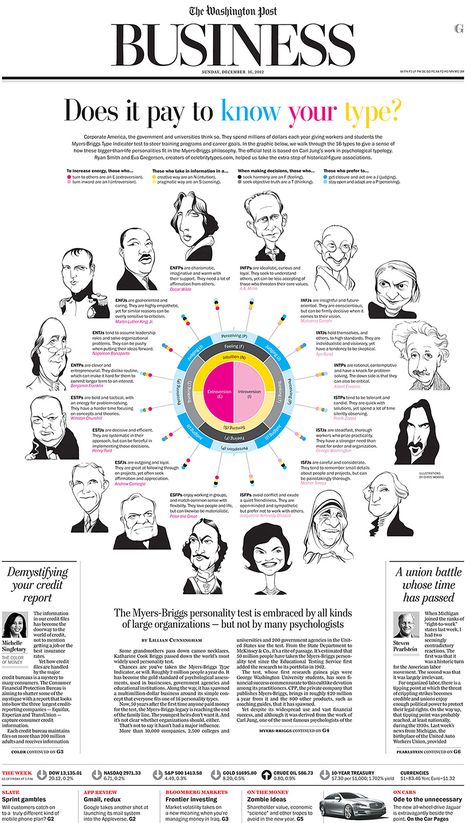 Although unpredictable at times, this rare combination could be an important asset if fully utilized.
Although unpredictable at times, this rare combination could be an important asset if fully utilized.
How many personality types are there?
Depending on the model, you can have just four or five personality types or sixteen or more. Here are the most common ways of categorizing personalities.
The Big Five personality traits
This model looks at how a person thinks, feels and behaves. What is called “openness to experience” refers to curiosity and creativity. "Conscientiousness" measures affinity for organization and responsibility. Measuring "extraversion" provides insight as to sociability and being assertive. "Agreeableness" refers to getting along with people, being compassionate and showing respect. Finally, things like anxiety and depression are measured by "neuroticism".
Myer-Briggs Type Indicator
This test measures how people perceive their worlds, make decisions, and interact with others. It's not ideal as a pre-employment test because it can be easily manipulated.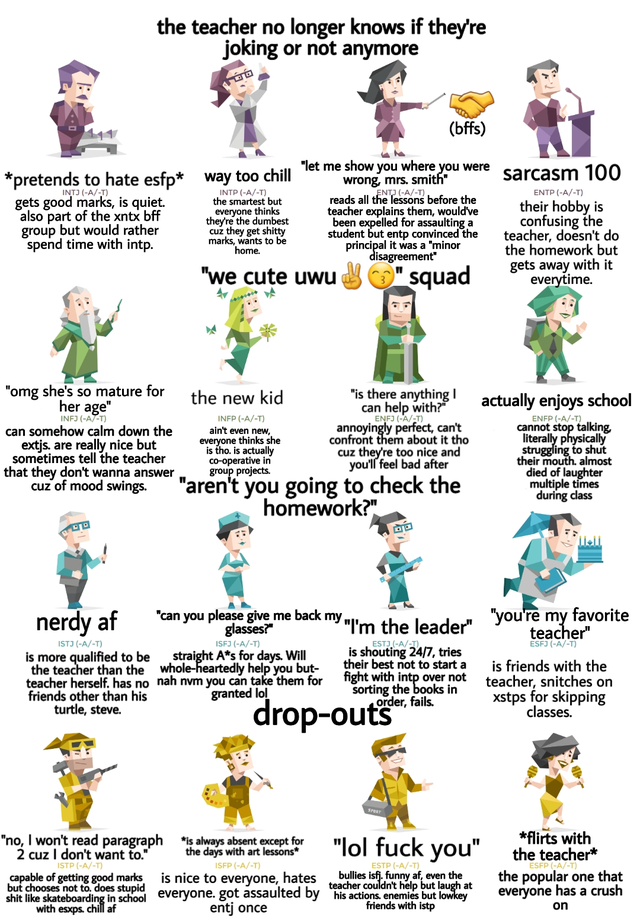 People can guess what answers might seem most desirable for a given role. It also outputs rather complex results, making it impractical for hiring and managing people.
People can guess what answers might seem most desirable for a given role. It also outputs rather complex results, making it impractical for hiring and managing people.
16 Personality Types
The Myers-Briggs® model identifies four personality trait clusters that can combine in multiple ways, leading to sixteen distinct combinations. While valid results can be fascinating, they're just not practical or reliable for managing teams. The Type A B C D personality test model that Hire Success® uses evaluates 20 different trait scales independently, providing three-dimensional insight in a simple format. It reveals the individual without forcing them into one of four boxes.
How to use the 4 basic personality types: A, B, C, and D
Expect similar descriptions printed on the Hire Success® Overview Report. Each applicant is instructed to respond to the Hire Success®Personality Profile form based on how they work. The results will indicate which of the four personality types they draw from most.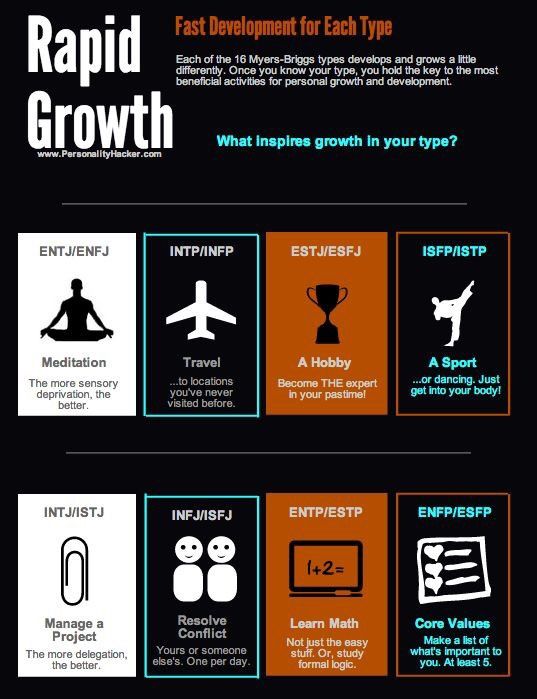 The system automatically provides a description of the primary personality at the beginning of the Overview Report. Variations of the above will be printed if the test taker is a combination of more than one personality type, or a Type X. You can compare the results against the baseline you developed to help speed up your hiring process.
The system automatically provides a description of the primary personality at the beginning of the Overview Report. Variations of the above will be printed if the test taker is a combination of more than one personality type, or a Type X. You can compare the results against the baseline you developed to help speed up your hiring process.
In the Summary Report, a bar chart is provided along with a percentage, or strength, of each of the four personality types. The higher the percentage, the more dominant that personality type. When two or more types of personality are close, or the same, in strength, the applicant may be characteristic of both types.
These Type A, B, C, and D personality descriptions are classic descriptions designed to provide you with some background information about a personality. The Hire Success® system uses these descriptions for contrast to the specific descriptions and values found in the traits section of the report. In many cases, the applicant's individual traits may differ from what you may see described in the overall personality description.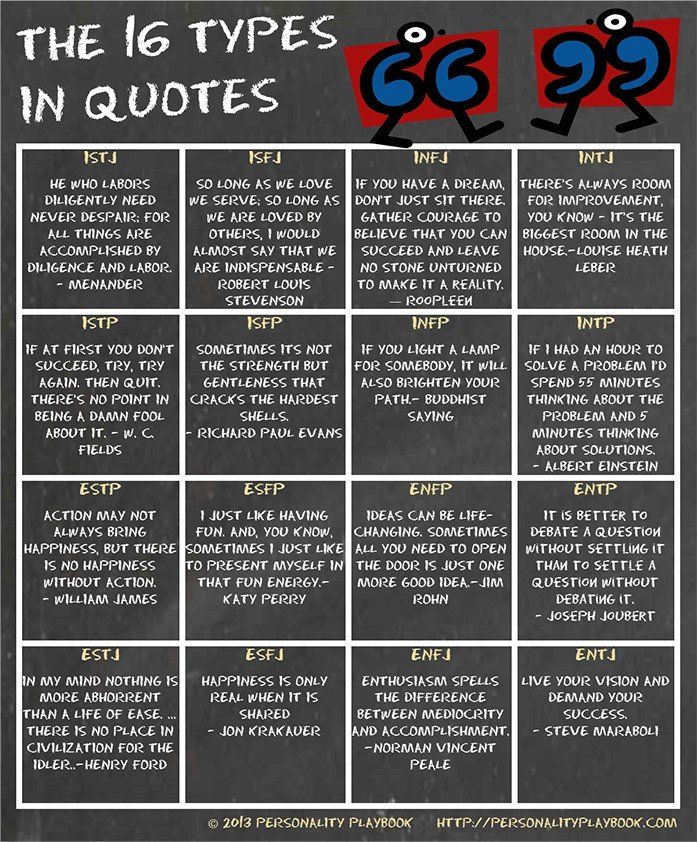
The Hire Success® system determines traits independently and doesn't base trait information on what might be expected from a particular personality type. The inclusion of these expanded traits is one of the ways the Hire Success® system differs from other systems, like Myers-Briggs®, and opens the door to highlight those differences that make the applicant a unique individual — not one squeezed into one of four boxes. If and when you see a trait differ from what might be described in the personality overview, it's not a mistake. It's most likely the trait you can expect to see from the applicant on a day-to-day basis and not just an expectation based on a traditional Type A, B, C, or D personality description.
Back to Top
Try Free Book demo
How knowledge of personality types changes lives
Every day we are bombarded with advertisements for self-knowledge courses, online tests “What kind of animal are you” and other ways to know yourself a little more.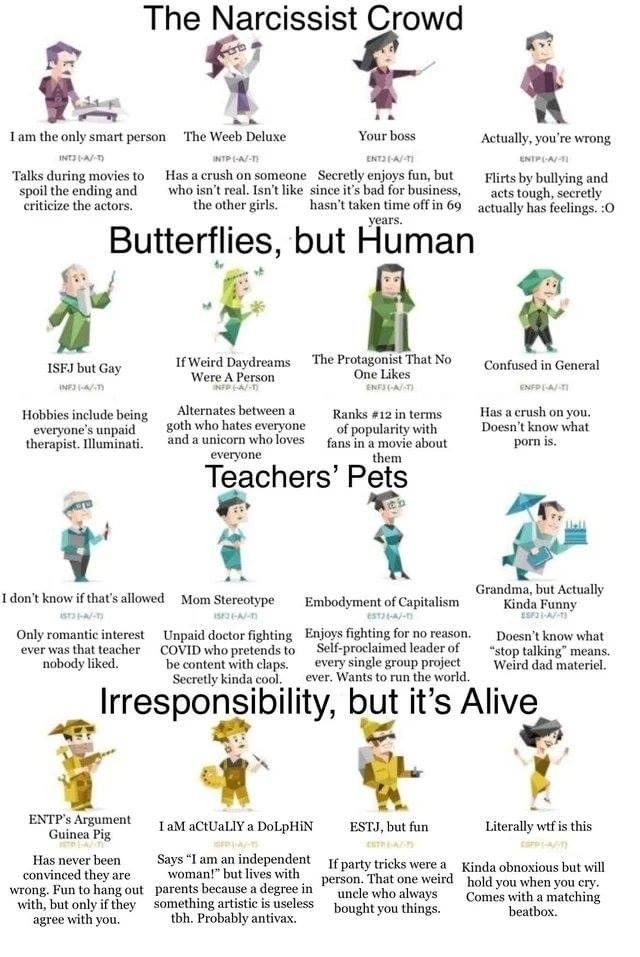 The reason for this is simple - we want to find the key to our inner world and find answers to exciting questions. Not all information on this topic on the Internet really helps, more often it is entertaining. But there are proven ways to know yourself, and one of them is test to determine the type of personality according to the system MBTI . Here are 5 reasons why knowing your personality type changes your life for the better:
The reason for this is simple - we want to find the key to our inner world and find answers to exciting questions. Not all information on this topic on the Internet really helps, more often it is entertaining. But there are proven ways to know yourself, and one of them is test to determine the type of personality according to the system MBTI . Here are 5 reasons why knowing your personality type changes your life for the better:
1. You will understand that thinking differently is great
Each person is individual and this makes our life brighter. We all think and act differently. Someone with a light heart jumps on a plane and goes to conquer the huge waves in Hawaii, and for someone even a trip to a neighboring city requires a lot of effort and careful planning. There are no right and wrong people. Personality types are created just to help people understand - no matter how you think - this is normal, the rest are just the same. nine0007
2.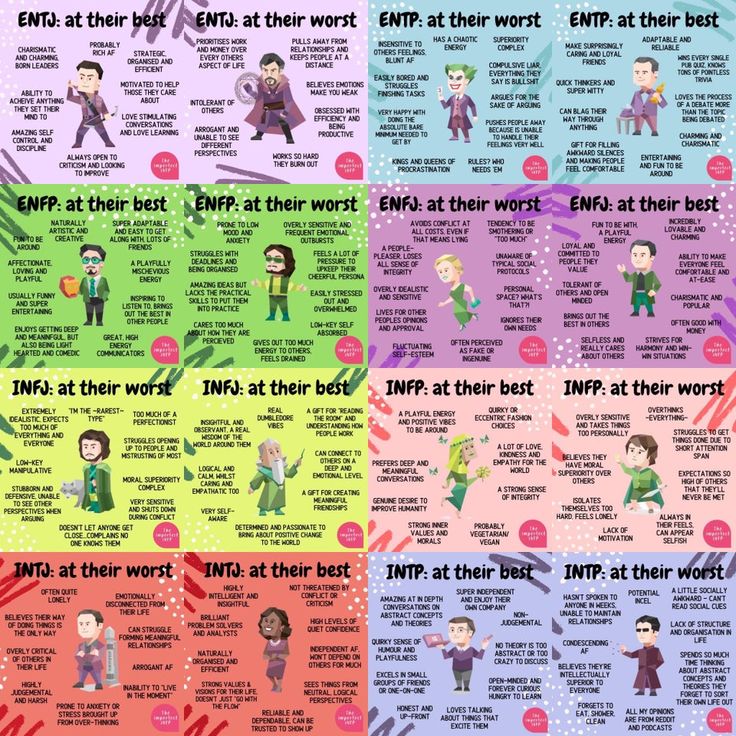 Understand yourself, which means you will become happier
Understand yourself, which means you will become happier
Knowing your personality type, you will find answers to the questions: What is the best way to build relationships with loved ones? Which university to choose? What is stopping me on the way to my dream? etc. By getting to know yourself, you will be better able to make the decisions that shape your life from day to day. Another nice bonus: while everyone will dream of a white yacht, you will achieve what is important for you.
3. Discover new ways to deal with stress
Unfortunately or fortunately, our life consists of ups and downs. What if we can prevent some problems? By learning about your personality type, you will discover ways to help yourself. For example, if you know that a quarrel with a loved one can be avoided by spending a couple of hours alone, the life of introverts will become much happier.
4. Easier to go through the thorns to the stars
Each MBTI type has its own characteristics , strengths and weaknesses.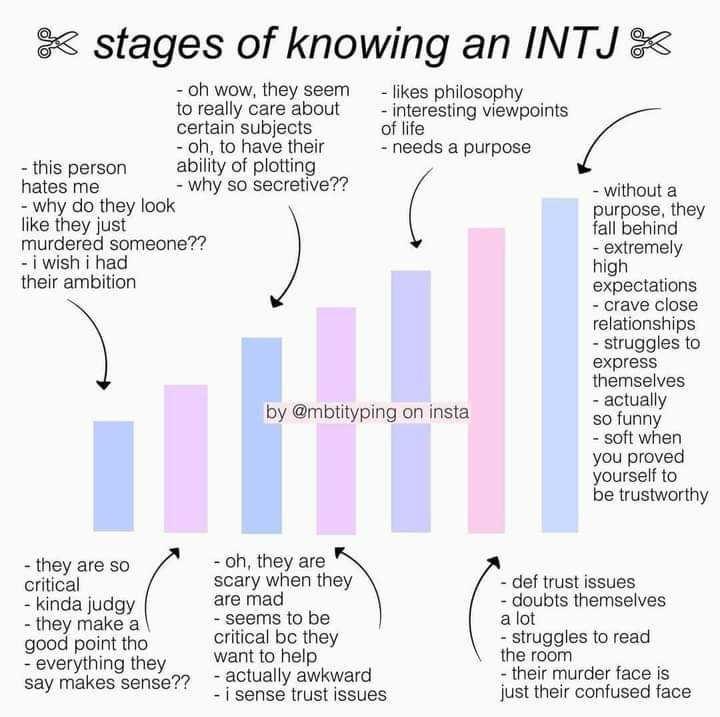 Perhaps you are an excellent employee, attentive to details and do everything on time, but communication with people is difficult: you can’t express your feelings and people unfairly consider you unemotional and withdrawn. Knowing your personality type, you will be able to focus on strengths , understand how to reduce harm from weaknesses and benefit even from unpleasant situations.
Perhaps you are an excellent employee, attentive to details and do everything on time, but communication with people is difficult: you can’t express your feelings and people unfairly consider you unemotional and withdrawn. Knowing your personality type, you will be able to focus on strengths , understand how to reduce harm from weaknesses and benefit even from unpleasant situations.
5. Stop blaming others for imperfections and become closer
We have already figured out that it is a mistake to think that people want the same thing. After familiarizing yourself with the MBTI system, you will no longer be annoyed by the behavior of others, because you will know what caused it. By better knowing each other's personality traits, you will be able to more accurately respond to the needs of loved ones and build strong partnerships.
Pass test to determine the type of personality and offer to do it to your loved ones - you will discover a lot of interesting things!
7 personality types: how to communicate and work with them
When we see a person for the first time, we get only 5% of information about him.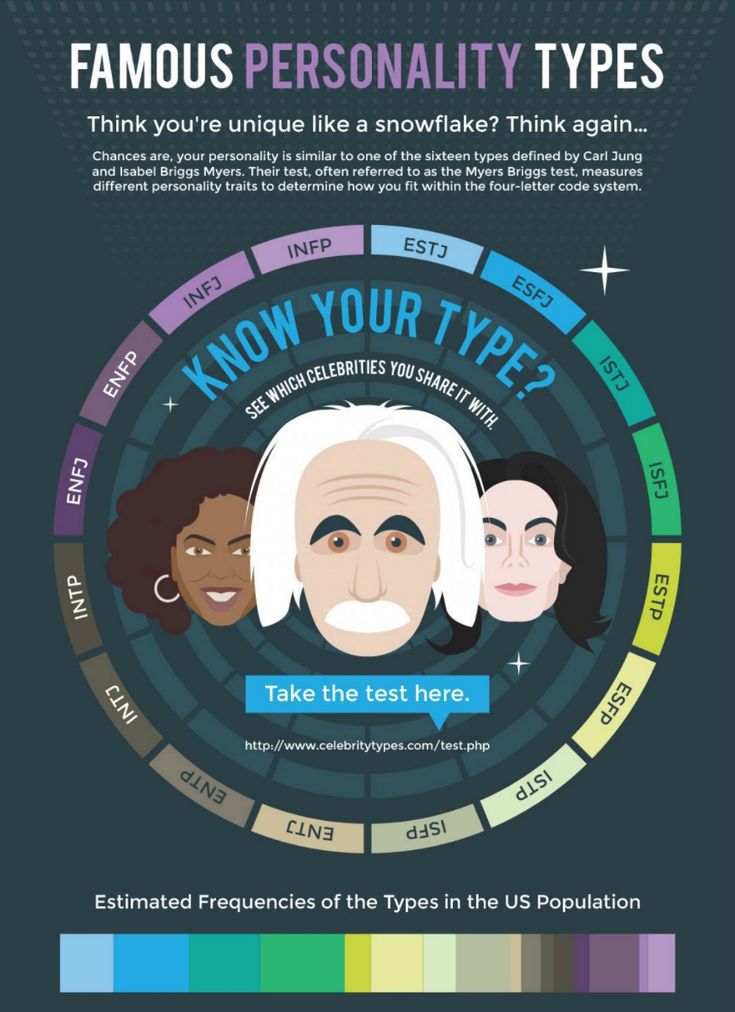 To build the right communication, this data is not enough.
To build the right communication, this data is not enough.
Alexander Malygin, co-founder of the Human Detector Business Services Center, told how to learn how to instantly read information about people.
We have recorded key points from his seminar “Effective Communication. We read the interlocutor at a glance.
How is our personality?
If you depict a person in the form of a diagram, it will look like this:
1. Essence, or that which is unchanging and given to us by genetics. So to speak, "factory settings".
2. Education and the influence of society.
3. Social mask, or what we broadcast to the outer space.
These aspects determine how our communications are built in real life. When people do not yet know each other, they communicate at the level of social attitudes.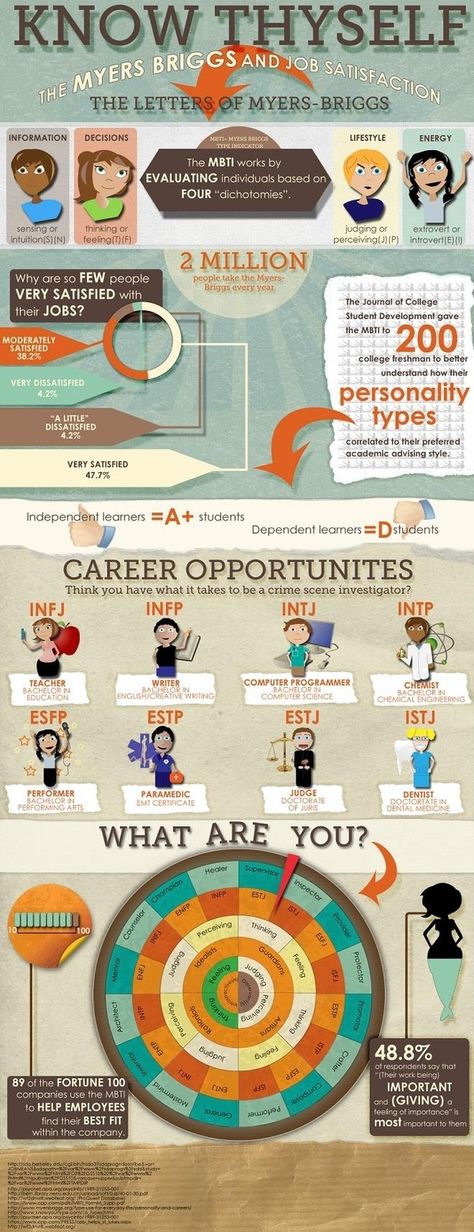 nine0007
nine0007
That is, they use a social mask. When they get to know each other a little, the upbringing of society comes into play and the essence is partially manifested. If the interlocutors have known each other for a long time, the leading role in communication is played by the essence and a little - upbringing.
All business content in a convenient format. Interviews, case studies, life hacks corp. of the world - in our telegram channel. Join now!
Although we are all individuals, we can be divided into groups according to formal characteristics - like cars or smartphones. nine0007
With technology, everything is simple - there are images by which we immediately determine the characteristics. What about people? Our behavior is controlled by the ratio of hormones in the blood.
Knowing which of them prevail in the human body, it is possible with a high probability to predict his psychotype and character traits.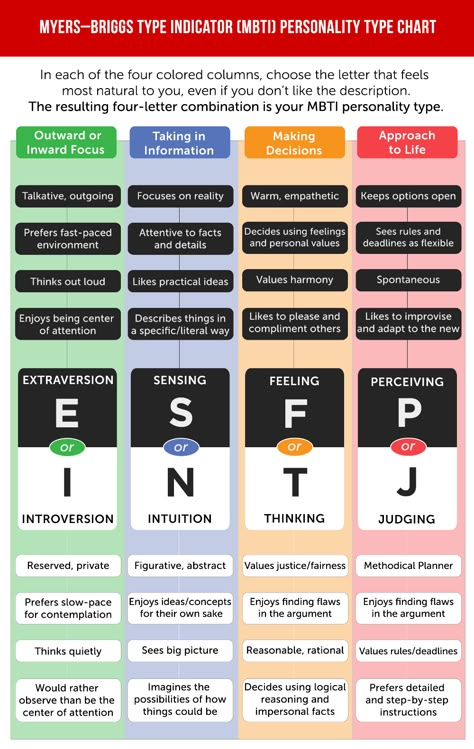
The experience of Human Detector shows that with the right typing in the first seconds of meeting a person, you can:
- recognize his principle of thinking
- Understand the principle of communication
- Determine the Professor
- Make assumptions about hobbies and hobbies
- Understand how active your interlocutor is
9000 - to find out with whom it will be compatible
- and even - how to sell him correctly
Tip: choosing a business partner like us, we make a serious mistake, because both of them have the same attitudes. This means that sooner or later everyone will start to “pull the blanket over themselves”, and the partnership will grow into open competition. nine0007
Business partners should not be the same in subconscious values. They must complement each other.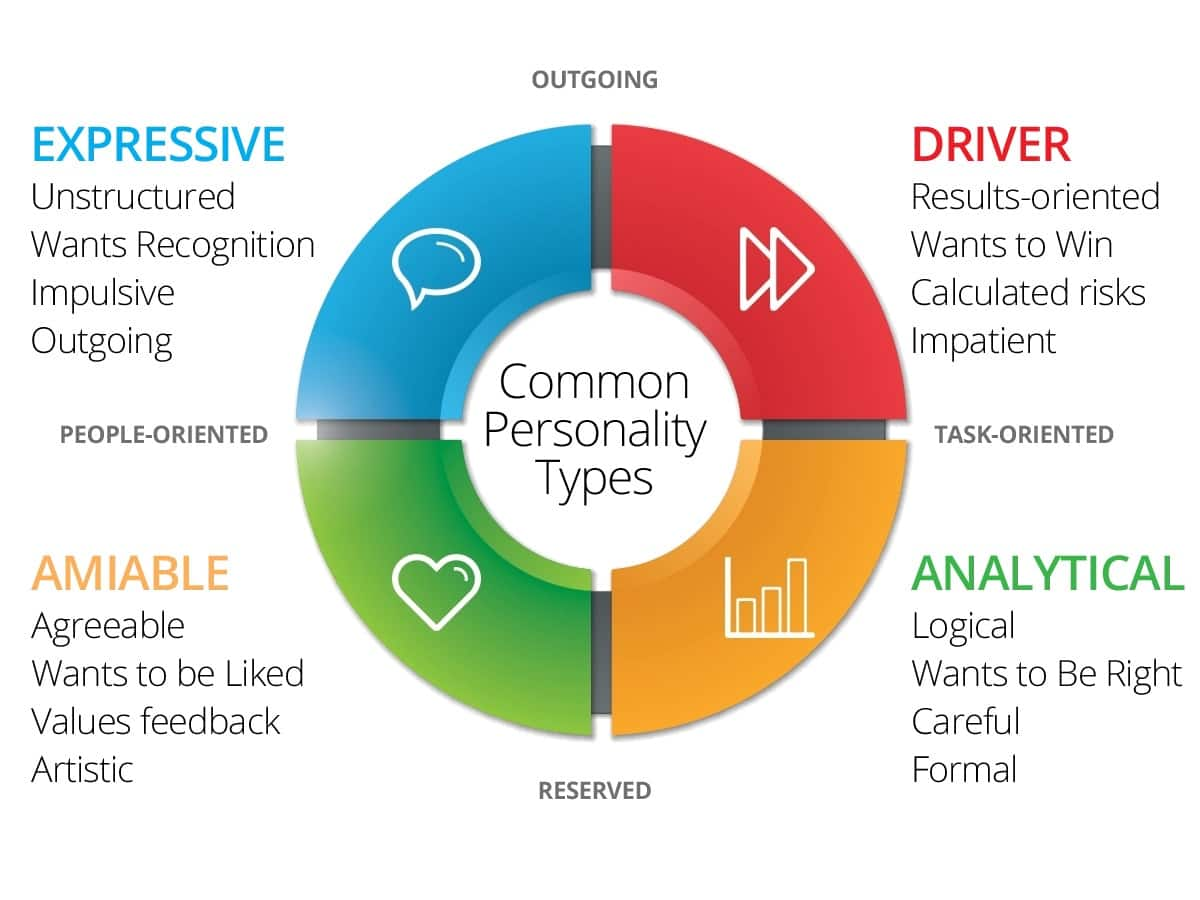
If both want to earn as much money as possible, they will start fighting for resources.
As a result, there will be a crisis of confidence, and the paths will part. It is important to strike a balance: for example, one wants money, and the other wants to create a cool product. In such a tandem, success is possible. If, of course, the distribution of roles is correct.
What are people like?
It would seem that the general rules of communication are simple and have long been known in marketing. To enlist the confidence of the interlocutor, you need:
- Caunch a smile of
- Interesting with communication
- Mix
- Compliment
9000 - to look neat and not irritating
- offer to continue communication in an informal setting
- take into account the peculiarities of the interlocutor's communication
Still, these are general techniques.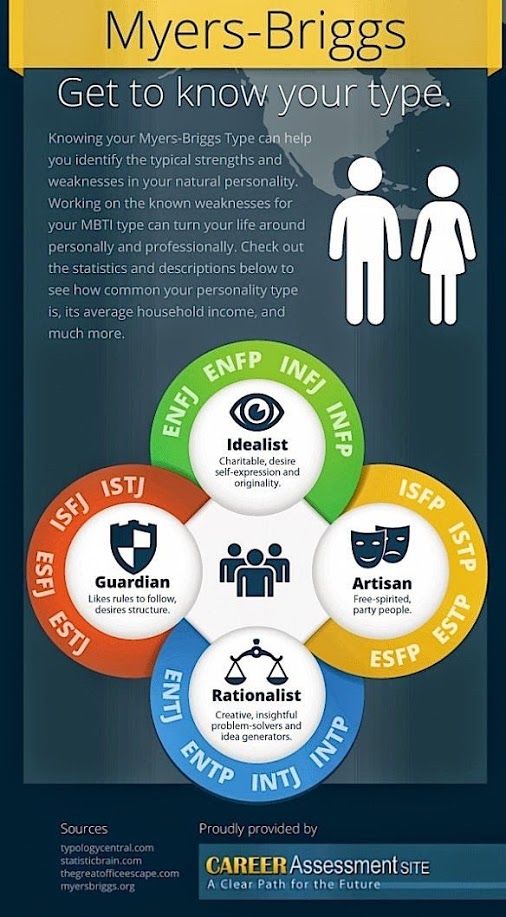 What works for one is unacceptable for another. To find a personal approach to a person, it is important to build communication, taking into account the type of his personality.
What works for one is unacceptable for another. To find a personal approach to a person, it is important to build communication, taking into account the type of his personality.
For more than 100 years, scientists have studied the influence of the hormones that predominate in the human body on its behavior and performance. The experiments were carried out in 80 countries of the world, and more than 25 thousand people took part in them.
As a result, seven personality types were identified. Today, this knowledge is used in communication, as well as to assess the potential of employees.
Let's consider each type in more detail.
Of course, exceptions are possible. In one person, the qualities of two endotypes can be combined. Nevertheless, the technique is considered quite accurate and allows you to get 80% of knowledge about a person at a glance.
Type #1. Fidget
What they look like: are usually people of average height, thin, very active, with thin wrists.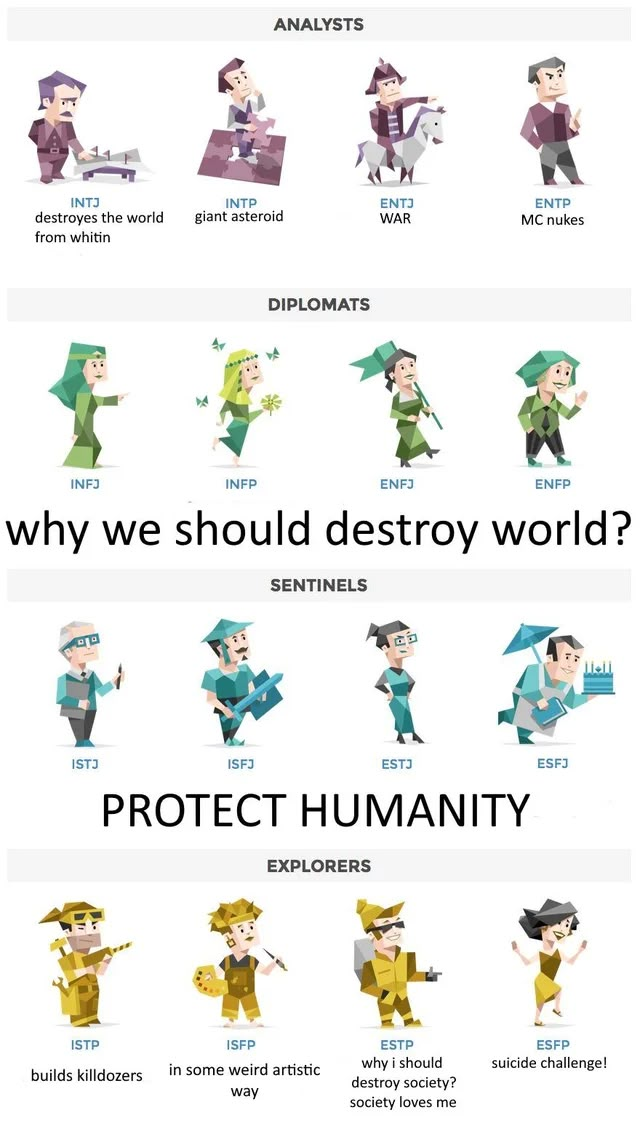 They look younger than their age and are very active due to their increased metabolism. nine0007
They look younger than their age and are very active due to their increased metabolism. nine0007
T3 and T4 hormones from the group of thyroid hormones predominate in their body.
Prominent representatives: Jeff Bezos, Sergey Brin, Pavel Durov.
Principle of thinking: people of this type are very fond of talking. Speech is a vital resource for them. At the same time, the listeners of them are unimportant.
Favorite phrase of such people: "Forgive me for interrupting."
They live with emotions and sensations. Information is also perceived emotionally. They are prone to distrust, looking for a catch in everything. nine0007
How to communicate with fidgets? It is necessary to let them speak, to be on a positive wave in conversation, to try not to cause doubts with their speeches.
How to work with fidgets? No need to be offended by a fidget if he didn't do something or forgot to call you back. The constant flow of thoughts in his head does not allow him to concentrate on one thing.
The constant flow of thoughts in his head does not allow him to concentrate on one thing.
Do not hesitate to remind about the agreements, always control the assigned tasks. Fidgets are not very consistent managers. There is always a risk that deadlines may be missed or something overlooked. nine0007
Type #2. Skeptic
What they look like: skeptics are often overweight. They have sloping shoulders, pale skin, and some puffiness. The main hormone in their body is melatonin.
Outstanding representatives: Elon Musk, Angela Merkel, Steve Ballmer.
Principle of thinking: this type of people strives to be safe, loves solitude and does not believe in success without super efforts. Self-will and stubbornness are their hallmarks. nine0007
How to deal with skeptics? It is important to become their ally and let them know that you will not harm them.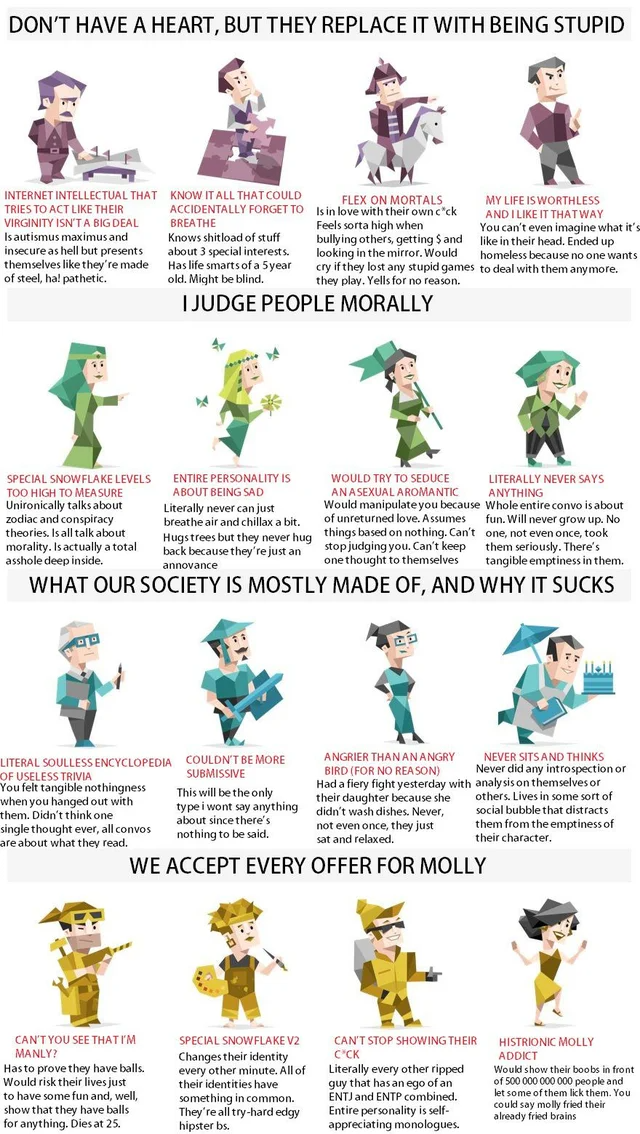 These people cannot be pressured. Speak calmly and slowly, do not show stormy joy.
These people cannot be pressured. Speak calmly and slowly, do not show stormy joy.
Especially if it is for no reason.
How to deal with skeptics? Do not expect instant results from them, do not set urgent tasks. These people work at their own pace, not fast at all. The skeptic works best in the evening.
Therefore, they can take "homework assignments". They also work remotely.
Type #3. Sun
What they look like: is the rarest type of people. There are only 5% of them in the world. In terms of appearance, this is a classic standard of beauty. Men are distinguished by high growth and broad shoulders. Girls of this type have an ideal figure.
Outstanding representatives: Lawrence Ellison, Pierce Brosnan.
The principle of thinking of these people: "I am the center of the world", "Everything should be my way.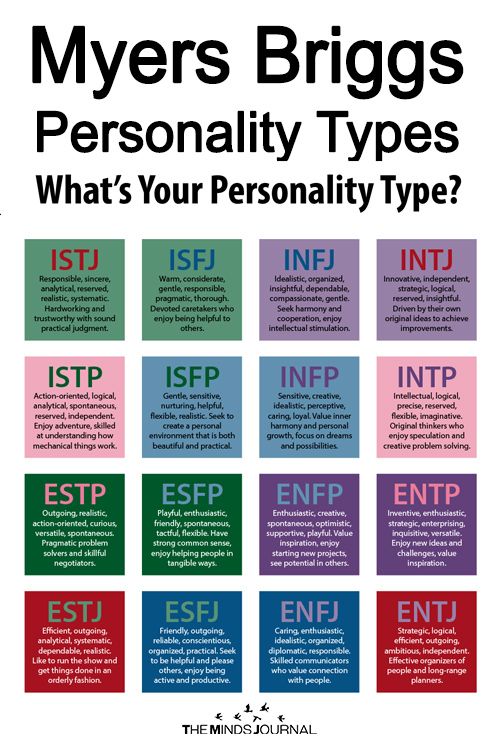 " They love holidays and parties, they cannot stand loneliness, they always strive to be in the thick of things, they are emotional and selfish. nine0007
" They love holidays and parties, they cannot stand loneliness, they always strive to be in the thick of things, they are emotional and selfish. nine0007
This type of person is so accustomed to compliments that over time they simply stop responding to them.
They have fits of sadness, but usually they do not last long: 5-10 minutes of sadness - and these people are ready to have fun again.
How to communicate with the sun? Play along with the sun, admire it, share positive emotions. Let you feel like the main character, do not disturb the atmosphere of the holiday.
By the way, such people can be useful not only in secular parties, but also in business. nine0007
They will not understand your product, but they will be able to attract the attention of an investor to your company. Communication and the ability to interest are their strengths.
How to work with the sun? Do not forget to praise such people for their achievements, and they will conquer new heights.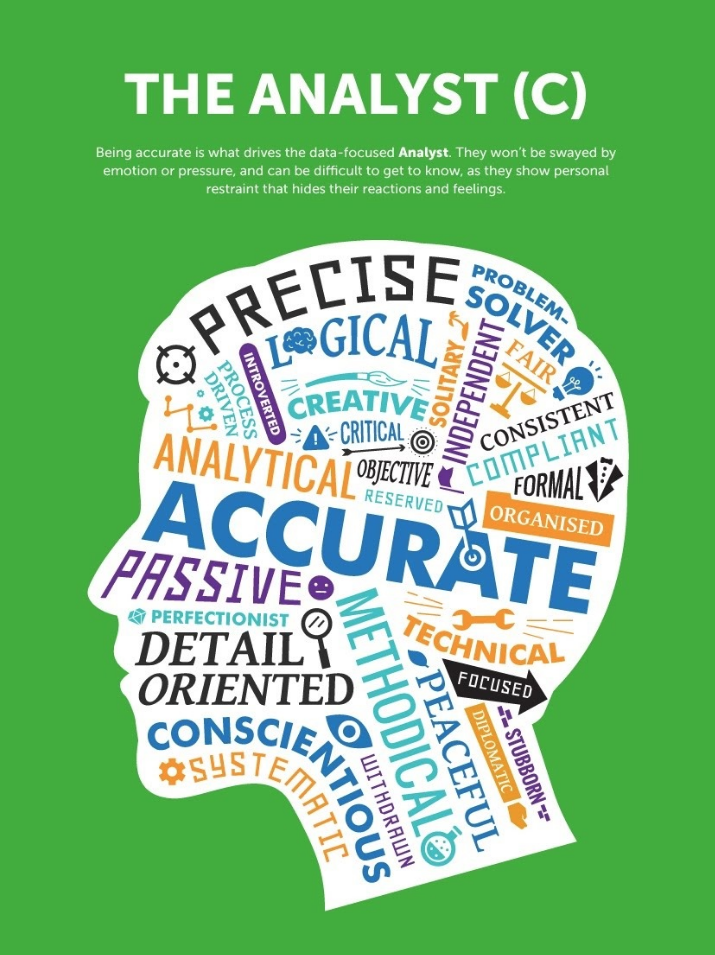 Slightly flatter the vanity of the sun, but do not let it sit on your neck.
Slightly flatter the vanity of the sun, but do not let it sit on your neck.
Type #4. Fighter
What they look like: are people of average height with wide wrists and short fingers, of a dense build. They are always internally tense. Adrenaline dominates in the body of fighters. nine0007
Featured Representatives: Mike Tyson, Jason Statham.
The principle of thinking: fighters are distinguished by straightforwardness in judgments, negative perception of the world, irascibility. These people see a problem in everything that needs to be solved urgently.
At the same time, they have a heightened sense of justice. They are able to protect others if they believe that they have been undeservedly offended.
People in life and business love directness and honesty, even if the truth looks ugly. nine0007
How to communicate with fighters? Talk about the problem directly, do not try to smooth corners and hide negative facts.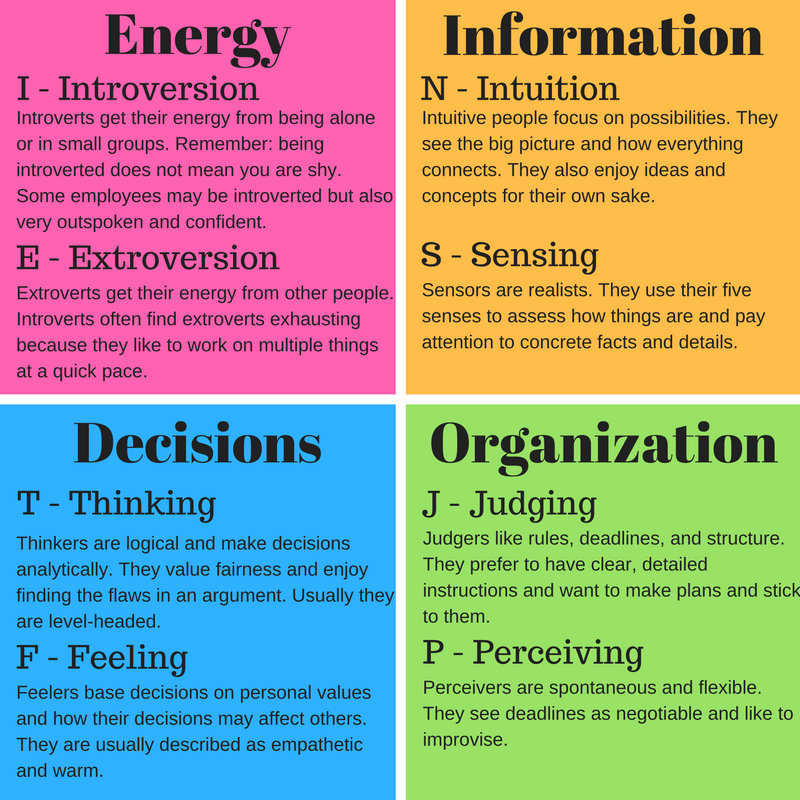 Don't get into arguments. Be equal, but be respectful at the same time.
Don't get into arguments. Be equal, but be respectful at the same time.
Appreciate their time: it is better to submit documents to such business partners in electronic form.
How to work with fighters? This type is the most conflicting. Don't aggravate your relationship with him. A fighter can be rude and harsh in communication, but all his efforts are directed only to the cause. nine0007
For him, there are no obstacles on the way to achieving the goal.
Type #5. Pedant
What they look like: they are tall and thin. Restraint can be traced in movements and speech. Somatotropin (growth hormone) and adrenocorticotropic hormone are responsible for all processes in the body of these people.
Outstanding representatives: Steve Jobs, Henry Ford, Keanu Reeves.
Principle of thinking: these people always stick to the plan, they like to make lists.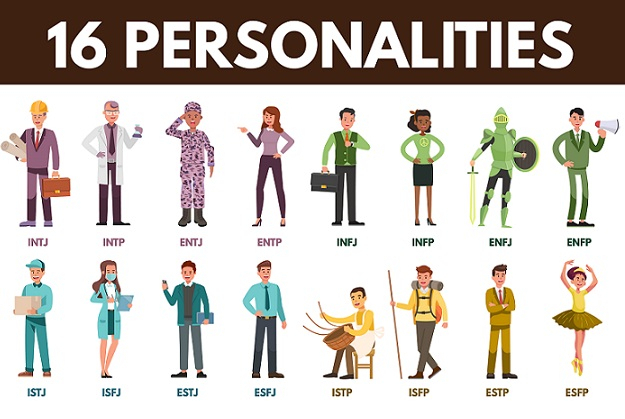 They are systemic, they keep everything under control. Rational in all actions and actions - from movements to spending. nine0007
They are systemic, they keep everything under control. Rational in all actions and actions - from movements to spending. nine0007
How to communicate with pedants? Use the principle of "first things first", be consistent and logical. In support of your words, give arguments, figures and facts. Speak slowly and without fuss.
How to work with pedants? They live and work in their own way. And carefully calculated. If you do not set specific deadlines for Pedant, he will calculate his time in a way that suits him.
This will probably not suit you: Pedants are usually slow and prefer to act measuredly. nine0007
Type #6. Boss
What they look like: are people with a big head, broad shoulders, with a developed chest. As a rule, they have muscular legs. The dominant hormone is oxytocin or the hormone of happiness.
Outstanding representatives: Steve Wozniak, Evgeny Chichvarkin, Gerard Depardieu.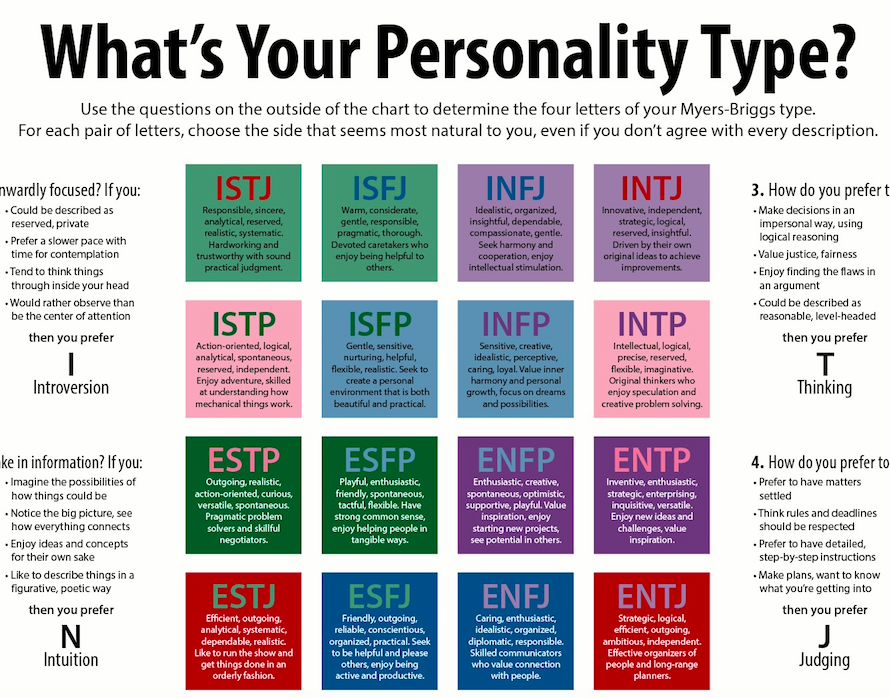
Principle of thinking: the boss wants everything at once. He is characterized by leadership, a large-scale vision of any situation, a sense of justice. Such people know how to make decisions and are not afraid of responsibility. nine0007
If you don't live up to your boss's trust, he will cut you out of his life forever. There will be no second chance to secure his favor.
How to communicate with the boss? Be respectful, praise him for accomplishments, speak clearly and to the point. Show that you value his time. Gifts for these people should be expensive, food should be tasty and of high quality, and the interior should be luxurious.
How to work with a boss? Give him freedom of action. At the same time, highlight the area of responsibility where he will be the full owner. Give the boss all the necessary resources and the ability to independently select a team.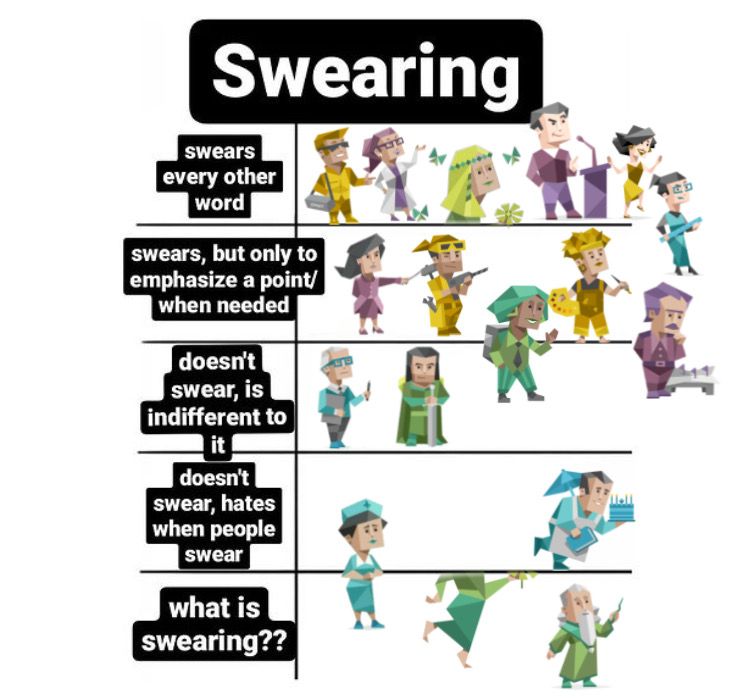 The result will meet your expectations. nine0007
The result will meet your expectations. nine0007
Type #7. Good-natured
How they look: are usually people with rounded features, short. They are distinguished by sloping shoulders and a good-natured appearance. There are two main hormones in the body of these people: estrogen and insulin.
Outstanding representatives: Mark Zuckerberg, Oskar Hartmann.
The principle of thinking: kind people are always ready to help, while they themselves are embarrassed to ask for something. Change is hard for them: most of all they value stability and constancy. nine0007
Often these are creative people who are able to see the unusual in everyday life. Kind people love moderately original clothes, they know how to create a beautiful interior around themselves, they are endowed with excellent taste.
How to communicate with a kind person? The motto of these people: "Let's live together. " When talking with them, it is important to radiate kindness, not to show negativity. Speech should be calm and unhurried. It is important to create an aura of serenity.
" When talking with them, it is important to radiate kindness, not to show negativity. Speech should be calm and unhurried. It is important to create an aura of serenity.
How to work with kind people? These are good performers. They are afraid to let the team down and are ready to help everyone around them. The main thing is that there is no emotional tension in the team and the atmosphere helps to reveal the creative potential of good-natured people. nine0007
All processes in our mind are controlled by the endocrine system. Knowing its type, a person can be read like a book: find points of contact and remove barriers in communication.
The typology can be used both in marketing and during behavioral interviews.
If some basic qualities are not inherent in the endotype of a person, then it will be difficult to develop them. Simply put, a fighter will never become the sun, and the boss will never be a fidget.